
- •20 Food and drink 184
- •21 Sport and competition 191
- •23 Holidays and special 208 occasions
- •Introduction
- •10 I Country and people
- •12 I Country and people
- •14 I Country and People
- •2 History
- •16 2 History
- •18 2 History
- •It was in this period that Parliament began its gradual evolution into the democratic body which it is today. The word 'parliament',
- •20 2 History
- •22 2 History
- •24 2 History
- •26 2 History
- •28 2 History
- •30 2 History
- •32 3 Geography Climate
- •It was in Britain that the word 'smog' was first used (to describe a
- •36 3 Geography
- •38 3 Geography
- •40 3 Geography
- •Part of Snowdonia National Park
- •4 Identity
- •44 4 Identity
- •IrroubleatLllangybi
- •46 4 Identity
- •48 4 Identity
- •50 4 Identity
- •52 4 Identity
- •54. 4 Identity
- •5 Attitudes
- •58 5 Attitudes
- •60 5 Attitudes
- •62 5 Attitudes
- •64 5 Attitudes
- •66 5 Attitudes
- •In the history of British comedy,
- •6 Political life
- •68 6 Political life
- •70 6 Political life
- •72 6 Political life
- •74 6 Political life
- •6 Political life
- •78 7 The monarchy
- •The reality
- •84 8 The government
- •86 8 The government
- •88 8 The government
- •In comparison with the people of
- •9 Parliament
- •92 9 Parliament
- •94 9 Parliament
- •96 9 Parliament
- •100 10 Elections
- •102 10 Elections
- •104 10 Elections
- •I've messed up my life
- •Serb shelling halts un airlift
- •2 January is also a public holiday in
- •Identity 42—55
- •Illustrations by:
>
By-elections
Whenever a sitting MP can no
longer fulfil his or her duties, there has to be a special new
election in the constituency which he or she represents. (There
is no system of ready substitutes.) These are called by-elections
and can take place at any time. They do not affect who runs the
government, but they are watched closely by the media and the
parties as indicators of the current level of popularity (or
unpopularity) of the government.
A by-election provides the
parties with an opportunity to find a seat in Parliament for one of
their important people. If a sitting MP dies, the opportunity
presents itself; if
not, an MP of the same party must be persuaded to resign.
The way an MP resigns offers a
fascinating example of the importance attached to tradition. It
is considered wrong
for an MP simply to resign; MPs represent their constituents
and have no right to deprive them of this representation. So the MP
who wishes to resign applies for the post of'Steward of the Chiltern
Hundreds'.This is a job with no duties and no salary. Technically,
however, it is 'an office of profit under the Crown' (i.e. a job
given by the monarch with rewards attached to it). According to
ancient practice, a person cannot be both an MP and hold a post of
this nature at the same time because Parliament must be independent
of the monarch. (This is why high ranking civil servants and army
officers are not allowed to be MPs.) As a result, the holder of this
ancient post is automatically disqualified from the House of Commons
and the by-election can go ahead!
In
the thirteen elections from 1945 to 1987, the Conservatives were
generally more successful than Labour. (> Party performance in
general elections since 1945). Although Labour achieved a majority
on five occasions, on only two of these was the majority
comfortable. On the other three occasions it was so small that it
was in constant danger of disappearing as a result of by-election
defeats (> Byelections) . In the same period, the Conservatives
won a majority seven times, nearly always comfortably. Then,
in the 1992 election, the Conservatives won for the fourth time in a
row - the first time this had been achieved for more than 160 years.
Moreover, they achieved it in the middle of an economic recession.
This made many people wonder whether Labour could ever win again. It
looked as if the swingometer's pendulum had stuck on the right.
Labour's share of the total vote had generally decreased in the
previous four decades while support for the third party had
grown since the early 1970s. Many sociologists believed this trend
to be inevitable because Britain had developed a middle-class
majority (as opposed to its former working-class majority). Many
political observers were worried about this situation. It is
considered to be basic to the British system of democracy that power
should change hands occasionally. There was much talk about a
possible reorganization of
Size
of overall majority in the House of Commons (with name of leader of
winning party)
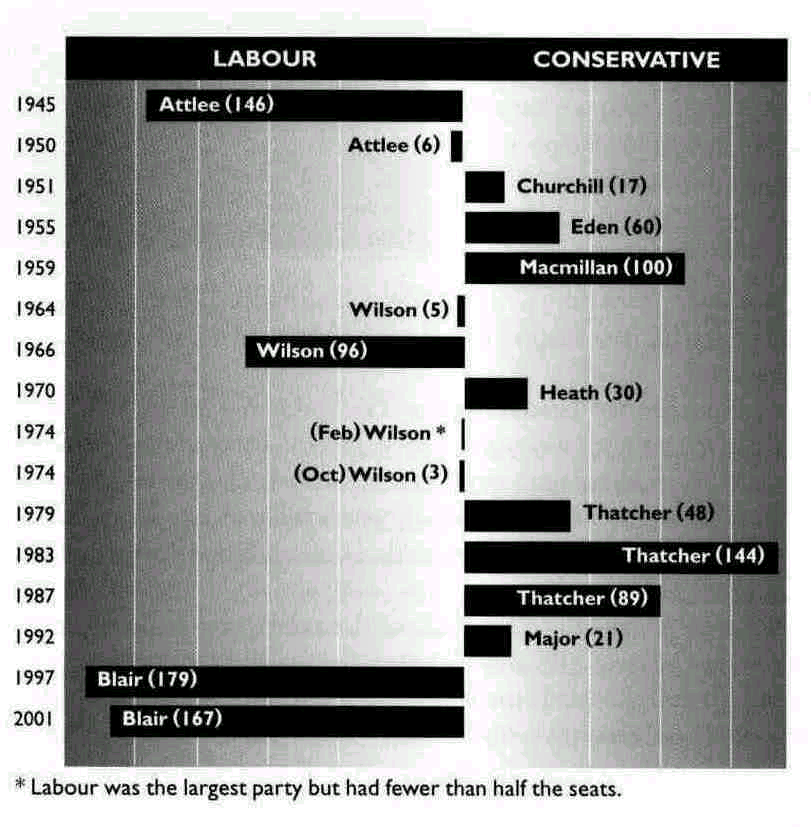
104 10 Elections
Recent results and the future 105
British politics, for example a change to a European-style system of proportional representation (so that Labour could at least share in a coalition government), or a formal union between Labour and the Liberal Democrats (so that together they could defeat the Conservatives).
However, in 1997 the picture changed dramatically. Labour won the largest majority in the House of Commons achieved by any party for 73 years and the Conservative share of the total vote was their lowest in 165 years. What happened? The answer seems to be that voting habits in Britain, reflecting the weakening of the class system, are no longer tribal. There was a time when the Labour party was regarded as the political arm of the trade unions, representing the working class of the country. Most working-class people voted Labour all their lives and nearly all middle-class people voted Conservative all their lives. The winning party at an election was the one who managed to get the support of the small number of 'floating voters'. But Labour has now got rid of its trade-union image. It is capable of winning as many middle-class votes as the Conservatives, so that the middle-class majority in the population, as identified by sociologists (see above), does not automatically mean a Conservative majority in the House of Commons.
QUESTIONS
1 The British electoral system is said to discriminate against smaller parties. But look at the table at the beginning of this chapter again. How can it be that the very small parties had much better luck at winning parliamentary seats than the (comparatively large) Liberal Democrats?
2 In what ways is political campaigning in your country different from that in Britain as described in this chapter?
3 Is there a similar level of public interest in learning about election results in your country as there is in Britain? Does it seem to reflect the general level of enthusiasm about, and interest in, politics which exist at other times - in Britain and in your own country?
4 Britain has 'single-member constituencies'. This means that one MP alone represents one particular group of voters (everybody in his or her constituency). Is this a good system? Or is it better to have several MPs representing the same area? What are the advantages and disadvantages of the two systems?
5 Do you think that Britain should adopt the electoral system used in your country? Or perhaps you think that your country should adopt the system used in Britain? Or are the two different systems the right ones for the two different countries? Why?
SUGGESTIONS
• If you can get British television or radio, watch or listen in on the night of the next British general election.
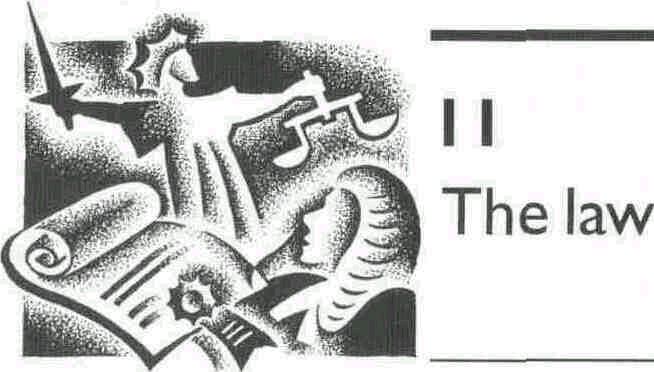
>
The organization of the police force
There is no national police
force in Britain.
All police employees work for one of the forty or so separate
forces which each have responsibility for a particular
geographical area. Originally, these were set up locally. Only
later did central government gain some control over them. It
inspects them and has influence over senior appointments within
them. In return, it provides about half of the money to run them.
The other half comes from local government.
The exception to this system
is the Metropolitan Police Force, which polices Greater London. The
'Met' is under the direct control of central government. It also
performs certain national police functions such as the registration
of all crimes and criminals in England and Wales and the
compilation of the missing persons register. New Scotland Yard is
the famous building which is the headquarters of its Criminal
Investigation Department (CID).
The
police and the public There
was a time when a supposedly typical British policeman could be
found in every tourist brochure for Britain. His strange-looking
helmet and the fact that he did not carry a gun made him a unique
symbol for tourists. The image of the friendly British 'bobby',
with his fatherly manner, was also well-known within the country
and was reinforced by popular television serials such as Dixon of
Dock Green (> Images of the police: past and present). This
positive image was not a complete myth. The system of policing was
based on each police officer having his own 'beat', a particular
neighbourhood which it was his duty to patrol. He usually did this
on foot or sometimes by bicycle. The local bobby was a familiar
figure on the streets, a reassuring presence that people felt
they could trust absolutely.
In the 196os the situation began to change in two ways. First, in
response to an increasingly motorized society, and therefore
increasingly motorized crime, the police themselves started
patrolling in cars. As a result, individual police officers became
remote figures and stopped being the familiar faces that they once
were. A sign of this change was the new television police drama, Z
Cars. This programme showed police officers as people with
real problems and failings who did not always behave in the
conventionally polite and reassuring manner. Some police were
relieved to be presented as ordinary human beings. But the
comparatively negative image of the police which this programme
portrayed caused uproar and several senior police officials
complained to the BBC about it! At the same time, the police found
themselves having to deal increasingly with public demonstrations
and with the activities of a generation who had no experience of
war and therefore no obvious enemy-figure on which to focus their
youthful feelings of rebellion. These young people started to see
the police as the symbol of everything they disliked about society.
Police officers were no longer known as 'bobbies' but became the
'fuzz' or the 'cops' or the 'pigs'.
Since the middle years of the twentieth century, the police in
Britain have lost much of their positive image. A child who is lost
is still advised to find a police officer, but the sight of one no
longer creates a general feeling of reassurance. In the i98os there
Crime and criminal procedure 107
were
a large number of cases in which it was found that police officers
had lied and cheated in order to get people convicted of crimes (>
The Stefan Kizsko case). As a result, trust in the honesty and
incorruptibility of the police has declined.
Nevertheless, there is still a great deal of public sympathy for
the police. It is felt that they are doing an increasingly
difficult job under difficult circumstances. The assumption that
their role is to serve the public rather than to be agents of the
government persists. Police officers often still address members of
the public as 'sir' or 'madam'. Senior officers think it is
important for the police to establish a relationship with
local people, and the phrase 'community policing' is now
fashionable. Some police have even started to patrol on foot again.
Generally speaking, the relationship between police and public in
Britain compares quite favourably with that in some other European
countries. British police still do not carry guns in the course of
normal duty (although all police stations have a store of weapons).
Crime and criminal procedure
There is a widespread feeling among the British public that crime
is increasing. Figures on this matter are notoriously difficult to
evaluate, however. One reason for this is that not all actual
crimes are necessarily reported. Official figures suggest that the
crime of rape increased by more than r-o% between 1988 and 1992.
But these figures may represent an increase in the number of
victims willing to report rape rather than a real increase in cases
of rape. >
Images of the police: past and present
>
The Stefan Kizsko case
On 18 February 1992, a man
who had
spent the previous sixteen years of his life in prison serving a
sentence for murder was released. It had been proved that he
did not in fact commit the crime.
In the early 1990s a large
number of people were let out of British gaols after spending
several years serving sentences for crimes they did not commit. The
most famous of these were 'the Guildford Four' and 'the Birmingham
Six', both groups of people convicted of terrorist bombings. In
every case, previous court judgements were changed when it became
clear that the police had not acted properly (for example, they had
falsified the evidence of their notebooks or had not revealed
important evidence).
Public confidence in the
police diminished. In the case of the alleged bombers, there
remained some public sympathy. The police officers involved may
have been wrong but they were trying to catch terrorists. The
Kizsko case was different. He did not belong to an illegal
organization. His only 'crime' was that he was in the wrong place
at the wrong time. He also conformed to a stereotype, which
made him an easy victim of prejudice. He was of below average
intelligence and he had a foreign name, so a jury was likely to see
him as a potential murderer.

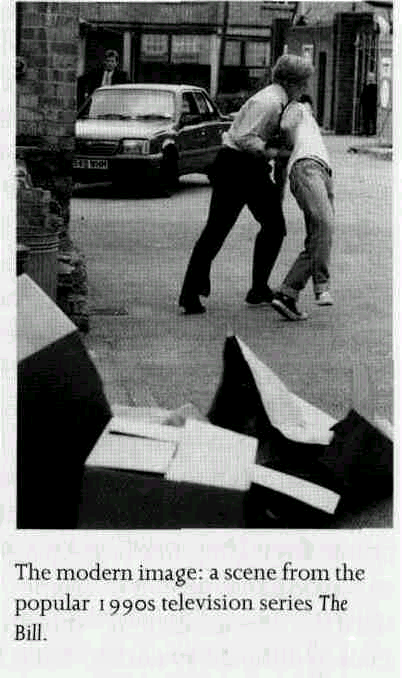
108 II The law
>
Caution!
'You do not have to say
anything unless you wish lo do so, but what you say may be given in
evidence'. These words are well-known to almost everybody in
Britain. They have been heard in thousands of police dramas on
television. For a long time they formed what is technically
known as the caution, which must be read out to an arrested person
in order to make the arrest legal. But, in 1994, the British
government decided that the 'right to silence' contained in
the caution made things too easy for criminals. This right meant
that the refusal of an arrested person to answer police questions
could not be used as part of the evidence against him or her. Now,
however, it can.
To accord with the new law,
the words of the caution have had to be changed. The new formula
is: 'You do not have to say anything. But if you do not mention now
something which you later use in your defence, the court may decide
that your failure to mention it now strengthens the case against
you. A record will be made of anything you say and it may be given
in evidence if you are brought to trial*.
Civil liberties groups in
Britain are angry about this change. They say that many arrested
people find it too difficult to understand and that it is not fair
to encourage people to defend themselves immediately against
charges about which they do not yet know the details. They are also
afraid it encourages false confessions.
>
Is crime increasing in Britain?
British people think that
crime is rising in Britain, but it is impossible to give a
completely reliable answer to this question. Figures vary from year
to year. In 1993 for instance, the total number of recorded crimes
in the London area actually went down by around i o%. And the
murder rate is no higher, or even lower, than it was during the
second half of the nineteenth century. However, there is no doubt
that in the last quarter of the twentieth century there was a
definite increase in certain types of crime. Crimes with firearms
(guns, rifles etc) are an example, as the graph shows.
Nevertheless,
it is generally accepted that in the last quarter of the twentieth
century, the number of crimes went up (> Is crime increasing in
Britain?). And the fear of crime seems to have increased a lot.
This has gone together with a lack of confidence in the ability of
the police to catch criminals. In the early 1990s private security
firms were one of the fastest-growing businesses in the country.
Another response to the perceived situation has been the growth of
Neighbourhood Watch schemes. They attempt to educate people in
crime prevention and to encourage the people of a particular
neighbourhood to look out for anything suspicious. In 1994 the
government was even considering helping members of these
schemes to organize patrols. There
has also been some impatience with the rules of criminal procedure
under which the police and courts have to operate. The police are
not, of course, above the law. When they arrest somebody on
suspicion of having committed a crime, they have to follow certain
procedures. For example, unless they obtain special permission,
they are not allowed to detain a person for more than twenty-four
hours without formally charging that person with having committed a
crime. Even after they have charged somebody, they need permission
to remand that person in custody (i.e. to keep him or her in
prison) until the case is heard in court. In 1994 public concern
about criminals 'getting away with it' led the government to
make one very controversial change in the law (> Caution!).
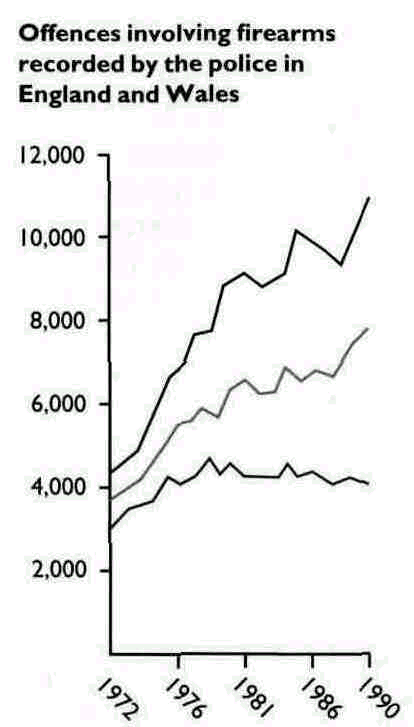
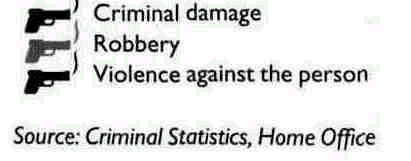
The system of justice 109
The
system of justice The
system of justice in England and Wales, in both civil and criminal
cases, is (as it is in North America) an adversarial system. In
criminal cases there is no such thing as an examining magistrate
who tries to discover the real truth about what happened. In formal
terms it is not the business of any court to find out 'the truth'.
Its job is simply to decide 'yes' or 'no' to a particular
proposition (in criminal cases, that a certain person is guilty of
a certain crime) after it has heard arguments and evidence from
both sides (in criminal cases these sides are known as the defence
and the prosecution). There
are basically two kinds of court. More than 90% of all cases are
dealt with in magistrates' courts. Every town has one of these. In
them, a panel of magistrates (usually three) passes judgement. In
cases where they have decided somebody is guilty of a crime, they
can also impose a punishment. This can be imprisonment for up to a
year, or it can be a fine, although if it is a person's 'first
offence' and the crime is not serious, they often impose no
punishment at all (t> The sentence of this court is...). Magistrates'
courts are another example of the importance of amateurism in
British public life. Magistrates, who are also known as Justices of
the Peace (JPs), are not trained lawyers. They are just ordinary
people of good reputation who have been appointed to the job by a
local committee. They do not get a salary or a fee for their work
(though they get paid expenses). Inevitably, they tend to come
>
How many victims?
One way of estimating the
level of crime is to interview people and ask them whether they
have been the victims of crime. On the left are some of the results
of a survey in 1990 which interviewed 2,000 people in several
countries. The figures show the percentages of interviewees who
said they had been victims. >
The sentence of this court is...
If it is someone's first
offence, and the crime is a small one, even a guilty person is
often
unconditionally
discharged.
He or she is set free without punishment.
The next step up the ladder
is a conditional discharge.
This means that the guilty person is set free but if he or she
commits another crime within a stated time, the first crime will be
taken into account. He or she may also be put
on probation, which
means that regular meetings with a social worker must take place.
A very common form of
punishment for minor offences is a
fine,
which means that
the guilty person has to pay a sum of money.
Another possibility is that
the convicted person is sentenced to a certain number of hours of
community
service.
Wherever possible,
magistrates and judges try not to imprison
people. This costs
the state money, the country's prisons are already overcrowded and
prisons have a reputation for being 'schools for crime'. Even
people who are sent to prison do not usually serve the whole time
to which they were sentenced. They get 'remission' of their
sentence for 'good behaviour'.
There is no
death penalti
in Britain, except for treason. It was abolished for all other
offences in 1969. Although public opinion polk often show a
majority in favour of its return, a majority of MPs has always been
against it. For murderers, there is an obligatory
life sentence.
However, 'life' does not normally mean life.
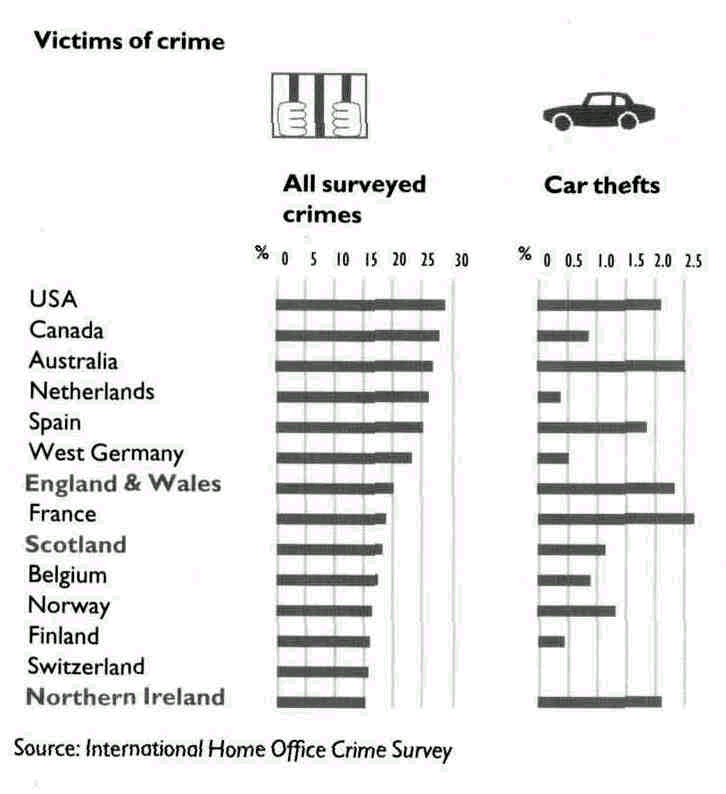
-
11The law
>
Some terms connected with the legal system
acquitted
found not guilty by the court
bail
a sum of money guaranteed by somebody on behalf of a person who has
been charged with a crime so that he or she can go free until the
time of the trial. If he or she does not appear in court, the
person "standing bail' has to pay the money.
convicted
found guilty by the court
defendant
the party who denies a claim in court; the person accused of a
crime
on remand
in prison awaiting trial
party
one of the sides in a court case. Because of the adversarial
system, there must always be two parties in any case: one to make a
claim and one to deny this claim.
plaintiff
the party who makes a claim in court. In nearly all criminal
cases, the plaintiff is the police.
verdict
the decision of the court
A typical courtroom scene showing the judge, the jury, and a
witness being questioned by a barrister (cameras are not
allowed in court)
from the wealthier
sections of society and, in times past, their prejudices were
very obvious. They were especially harsh, for instance, on people
found guilty of poaching (hunting animals on private land), even
though these people sometimes had to poach in order to put food on
their families' tables. In modern times, however, some care is
taken to make sure that JPs are recruited from as broad a section
of society as possible. Even
serious criminal cases are first heard in a magistrate's court.
However, in these cases, the JPs only need to decide that there is
a prima facie case against the accused (in other words, that it is
possible that he or she may be guilty)/they then refer the case to
a higher court. In most cases this will be a crown court, where a
professional lawyer acts as the judge and the decision regarding
guilt or innocence is taken by a jury. Juries consist of twelve
people selected at random from the list of voters. They do not get
paid for their services and are obliged to perform this duty. In
order for a verdict to be reached, there must be agreement among at
least ten of them. If this does not happen, the judge has to
declare a mistrial and the case must start all over again with a
different jury. A convicted person may appeal to the Court of
Criminal Appeal (generally known just as the Appeal Court) in
London either to have the conviction quashed (i.e. the jury's
previous verdict is overruled and they are pronounced 'not guilty')
or to have the sentence (i.e. punishment) reduced. The highest
court of all in Britain is the House of Lords (see chapter 9). The
duty of the judge during a trial is to act as the referee while the
prosecution and defence put their cases and question witnesses, and
to decide what evidence is admissible and what is not (what can or
can't be taken into account by the jury). It is also, of course,
the judge's job to impose a punishment (known as 'pronouncing
sentence') on those found guilty of crimes.
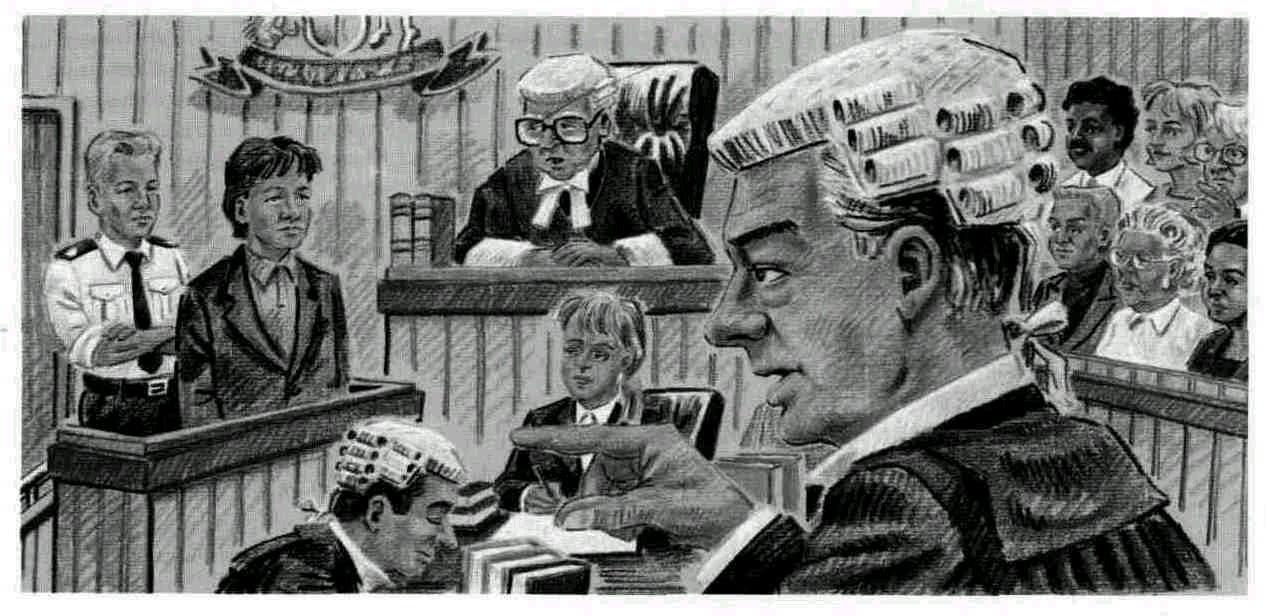
The legal profession 111
The
legal profession There
are two distinct kinds of lawyer in Britain. One of these is a
solicitor. Everybody who needs a lawyer has to go to one of these.
They handle most legal matters for their clients, including the
drawing up of documents (such as wills, divorce papers and
contracts), communicating with other parties, and presenting their
clients' cases in magistrates' courts. However, only since 1994
have solicitors been allowed to present cases in higher courts. If
the trial is to be heard in one of these, the solicitor normally
hires the services of the other kind of lawyer - a barrister. The
only function of barristers is to present cases in court. The
training of the two kinds of lawyer is very different. All
solicitors have to pass the Law Society exam. They study for
this exam while 'articled' to established firms of solicitors where
they do much of the everyday junior work until they are qualified. Barristers
have to attend one of the four Inns of Court in London. These
ancient institutions are modelled somewhat on Oxbridge colleges
(see chapter 14). For example, although there are some lectures,
the only attendance requirement is to eat dinner there on a certain
number of evenings each term. After four years, the trainee
barristers then sit exams. If they pass, they are 'called to the
bar' and are recognized as barristers. However, they are still not
allowed to present a case in a crown court. They can only do this
after several more years of association with a senior barrister,
after which the most able of them apply to 'take silk'. Those whose
applications are accepted can put the letters QC (Queen's Counsel)
after their names. Neither
kind of lawyer needs a university qualification. The vast majority
of barristers and most solicitors do in fact go to university, but
they do not necessarily study law there. This arrangement is
typically British (see chapter 14). The
different styles of training reflect the different worlds that the
two kinds of lawyer live in, and also the different skills that
they develop. Solicitors have to deal with the realities of the
everyday world and its problems. Most of their work is done away
from the courts. They often become experts in the details of
particular areas of the law. Barristers, on the other hand, live a
more rarefied existence. For one thing, they tend to come from the
upper strata of society. Furthermore, their protection from
everyday realities is increased by certain legal rules. For
example, they are not supposed to talk to any of their clients, or
to their client's witnesses, except in the presence of the
solicitor who has hired them. They are experts on general
principles of the law rather than on details, and they acquire the
special skill of eloquence in public speaking. When they present a
case in court, they, like judges, put on the archaic gown and wig
which, it is supposed, emphasize the impersonal majesty of the law. It
is exclusively from the ranks of barristers that judges are
appointed. Once they have been appointed, it is almost impossible
>
Ministry of justice?
Actually there is no such
thing in Britain. The things that such a ministry takes care
of in other countries are shared between a number of authorities,
in particular the Home Office, which administers prisons and
supervises the police, and the office of the Lord Chancellor, which
oversees the appointment of judges, magistrates and other legal
officers. >
The law in Scotland
Scotland has its own legal
system, separate from the rest of the United Kingdom. Although it
also uses an adversarial system of legal procedure, the basis
of its law is closer to Roman and Dutch law. The names of several
officials in Scotland are also different from those in England and
Wales. A very noticeable feature is that there are three, not just
two, possible verdicts. As well as 'guilty' and 'not guilty', a
jury may reach a verdict of 'not proven', which means that the
accused person cannot be punished but is not completely
cleared of guilt either.
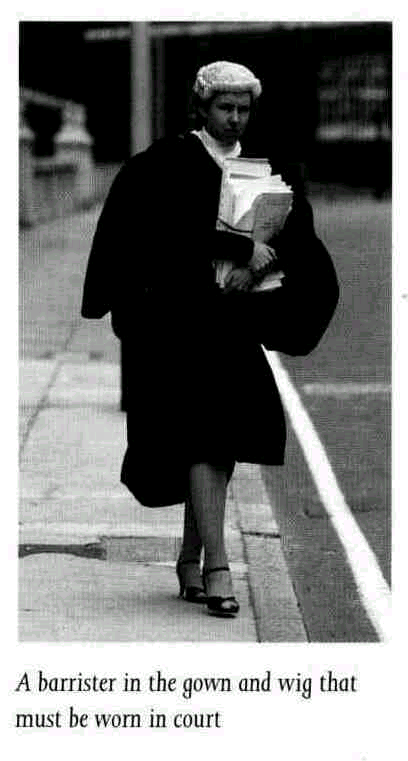
112 11 The law
for them to be dismissed. The only way that this can be done is by a resolution of both Houses of Parliament, and this is something that has never happened. Moreover, their retiring age is later than in most other occupations. They also get very high salaries. These things are considered necessary in order to ensure their independence from interference, by the state or any other party. However, the result of their background and their absolute security in their jobs is that, although they are often people of great learning and intelligence, some judges appear to have difficulty understanding the problems and circumstances of ordinary people, and to be out of step with general public opinion. The judgements and opinions that they give in court sometimes make the headlines because they are so spectacularly out of date. (The inability of some of them to comprehend the meaning of racial equality is one example. A senior Old Bailey judge in the 1980s once referred to black people as 'nig-nogs' and to some Asians involved in a case as 'murderous Sikhs'.)
QUESTIONS
1 The public perception of British police officers has changed over the last thirty years. In what ways has it changed, and why do you think this is?
2 It is one of the principles of the British legal system that you are innocent until proven guilty. However, miscarriages of justice do occur. How did the ones described in this chapter come about?
3 What are the main differences between the legal system in your country and that in Britain? Is there anything like the 'right to silence'? Are there any unpaid 'amateur' legal officers similar to Justices of the Peace? What kind of training do lawyers undergo? Compared with the system in your country, what do you see as the strengths and weaknesses of the British system?
4 British people believe that there is more crime in Britain than there used to be. What reasons
could there be for this? Is it true? Do you think of Britain as a 'safe' or 'dangerous' place? What about your own country - has crime increased there, or do people think that it has?
5 Many people in Britain argue that imprisonment is an ineffective and expensive form of punishment. Do you agree with this view? What alternative forms of punishment in use in Britain or in your country do you think are better, if any?
SUGGESTIONS
• There are many contemporary British writers who concentrate on the theme of crime and detection, among them Colin Dexter, whose books (such as The Dead of Jericho, Last Bus to Woodstock and The Wench is Dead) feature Inspector Morse. (Many of them have been adapted for television.) P D James and Ruth Rendell are two other highly respected writers of crime fiction.
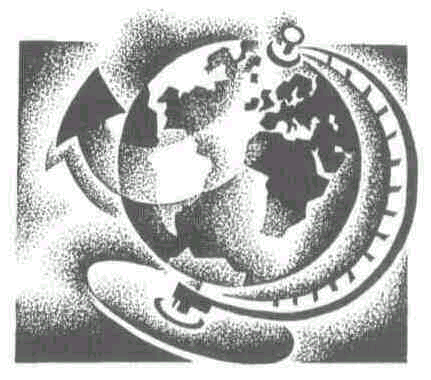
International relations
The relationship between any country and the rest of the world can
reveal a great deal about that country.
The end of empire
The map below shows the British empire in i 91 9, at the time of its greatest extent. By this time, however, it was already becoming less of an empire and more of a confederation. At the same international conference at which Britain acquired new possessions (formerly German) under the Treaty of Versailles, Australia, Canada, New Zealand and South Africa were all represented separately from Britain.
The real dismantling of the empire took place in the twenty-five years following the Second World War and with the loss of empire went a loss of power and status. These days, Britain's armed forces can no longer act unilaterally, without reference to the international community. Two events illustrate this. First, Suez. In 1956, Egypt, without prior agreement, took over the Suez canal from the international company owned by Britain and France. British and French
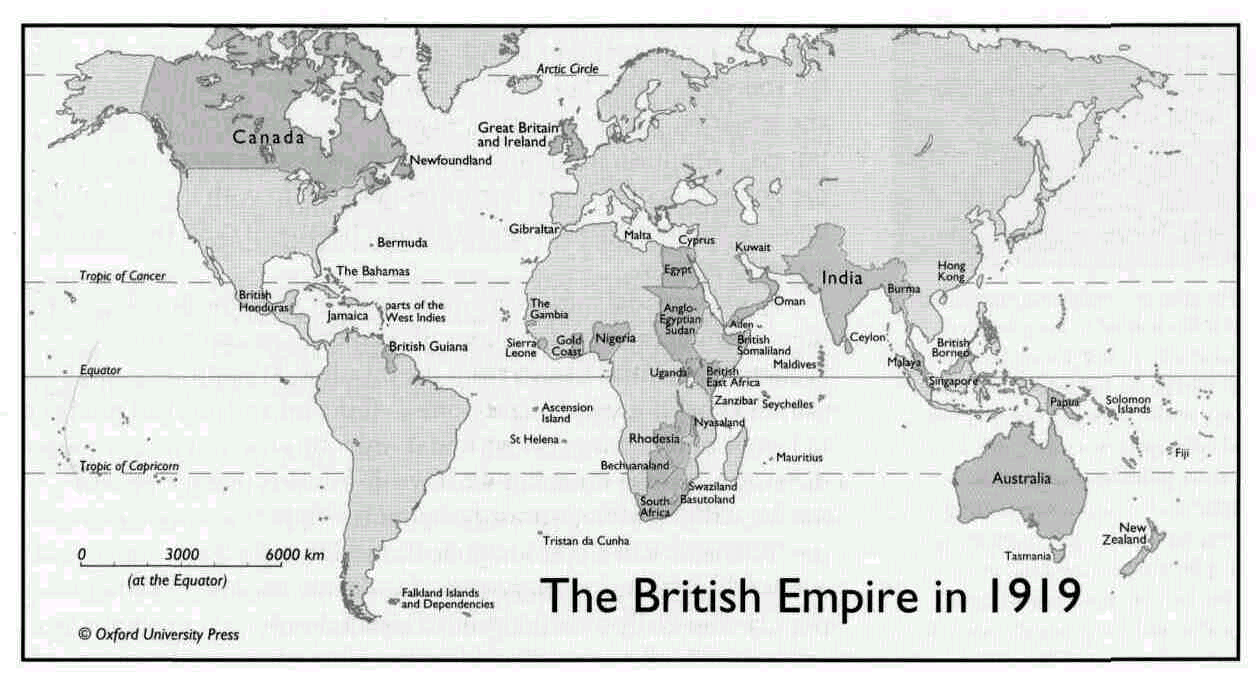
114 12 International relations
The opening ceremony
of the Commonwealth Games in 1994. This athletics contest is
held every four years.
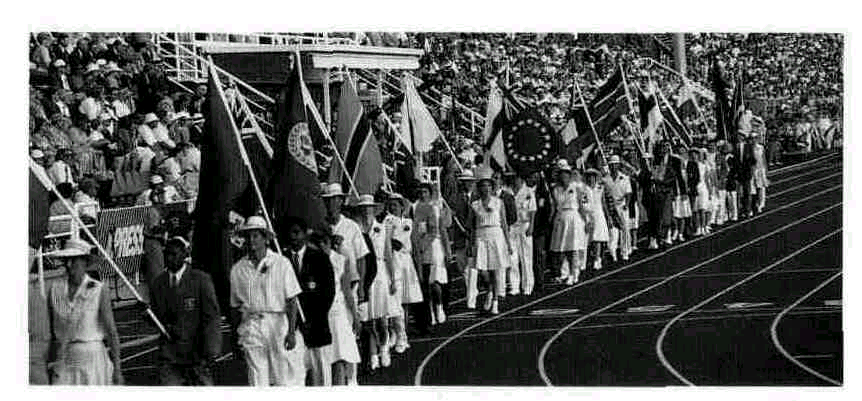
^The
Commonwealth
The dismantling of the
British empire took place comparatively peacefully, so that good
relations between Britain and the newly independent countries
were established. As a result, and with the encouragement of
Queen Elizabeth II, an international organization called the
Commonwealth, composed of the countries that used to be part of the
empire, has continued to hold annual meetings. Some countries in
the Commonwealth have even kept the British monarch as head of
state. There
are no formal economic or political advantages involved in
belonging to the Commonwealth, but it has helped to keep cultural
contacts alive, and does at least mean that every year the leaders
of a sixth of the world's population sit down and talk together.
Until quite recently it did have economic importance, with special
trading agreements between members. But since Britain became a full
member of the EEC, all but a few of these agreements have gradually
been discontinued.
military action to
stop this was a diplomatic disaster. The USA did not support them
and their troops were forced to withdraw. Second, Cyprus. When this
country left the British empire, Britain became one of the
guarantors of its independence from any other country. However,
when Turkey invaded the island in 1974, British military activity
was restricted to airhfting the personnel of its military base
there to safety. After
the Second World War and throughout the 1950s, it was understood
that a conference of the world's great powers involved the USA, the
Soviet Union and Britain. However, in 1962, the Cuban missile
crisis, one of the greatest threats to global peace since the war,
was resolved without reference to Britain. By the 1970s it was
generally accepted that a 'superpower' conference involved only the
USA and the Soviet Union. Despite
Britain's loss of power and status on the world stage, some small
remnants of the empire remain, Whatever their racial origins, the
inhabitants of Gibraltar, St Helena, the Ascension Islands, the
Falklands/Malvinas and Belize have all wished to continue with the
imperial arrangement (they are afraid of being swallowed up by
their nearest neighbours). For British governments, on the one hand
this is a source of pride, but on the other hand it causes
embarrassment and irritation: pride, because it suggests how
beneficial the British imperial administration must have been;
embarrassment, because the possession of colonial territories does
not fit with the image of a modern democratic state; and irritation
because it costs the British taxpayer money. The
old imperial spirit is not quite dead. In 1982 the British
government spent hundreds of millions of pounds to recapture
the Falklands/Malvinas Islands from the invading Argentinians. We
cannot know if it would have done so if the inhabitants had not
been in favour of remaining British and if Argentina had not had a
military dictatorship at the time. But what we do know is that the
government's action received enormous popular support at home.
Before the 'Falklands War', opinion polls showed that the
government was extremely unpopular; afterwards, it suddenly became
extremely popular and easily won the general election early in the
following year.
The armed forces 115
The
armed forces The
loyalty of the leaders of the British armed forces to the
government has not been in doubt since the Civil War (with the
possible exception of a few years at the beginning of the twentieth
century -see chapter 2). In addition, and with the exception of
Northern Ireland, the army has only rarely been used to keep order
within Great Britain in the last 100 years.
'National Service' (a period of compulsory military service for all
men) was abolished in 1957. It had never been very popular. It was
contrary to the traditional view that Britain should not have a
large standing army in peacetime. Moreover, the end of empire,
together with the increasing mechanization of the military, meant
that it was more important to have small, professional forces
staffed by specialists. The most obviously specialist area of
the modern military is nuclear weapons. Since the 1950s, the
Campaign for Nuclear Disarmament (CND) has argued, on both
moral and economic grounds, that Britain should cease to be a
nuclear power. At certain periods the CND has had a lot of popular
support (> Greenhorn Common). However, this support has not been
consistent. Britain still has a nuclear force, although it is tiny
compared to that of the USA.
The end of the 'Cold War' between the west and the Soviet Union at
the end of 198os caused the British government to look for the
'peace dividend' and to reduce further the size of the armed
forces. This caused protest from politicians and military
professionals who were afraid that Britain would not be able to
meet its 'commitments' in the world. These commitments, of course,
are now mostly on behalf of the United Nations or the European
Union. There is still a feeling in Britain that the country should
be able to make significant contributions to international
peacekeeping efforts. The reduction also caused bad feeling within
sections of the armed forces themselves. Its three branches
(the Army, the Royal Navy and the Royal Air Force) have distinct
traditions and histories that it was felt were being threatened.
The army in particular was unhappy when several famous old
regiments, each with their own distinct traditions, were forced to
merge with others. At one time, a number of upper-middle class
families maintained a tradition down the generations of belonging
to a particular regiment. Fewer and fewer such families exist
today. However, a career in the armed forces is still highly
respectable. In fact, Britain's armed forces are one of the few
institutions that its people admit to being proud of. Transatlantic
relations Since
the Second World War, British governments have often referred to
the 'special relationship* which exists between Britain and the
USA. There have been occasional low points, such as Suez (see
above) and when the USA invaded the Caribbean island of Grenada (a
member of the British Commonwealth). But generally speaking it
>
The senior service
This is a phrase sometimes
used to describe the Royal Navy. It was the first of the three
armed forces to be established. Traditionally, it traces its
history right back to King Alfred (see chapter 2).
>
Greenham Common
Greenham Common is the Royal
Air Force base in Berkshire which became ihe focus for anti-nuclear
campaigners (mainly women) in the 1980s. American Cruise nuclear
missiles were based there from 1983 to 1991.
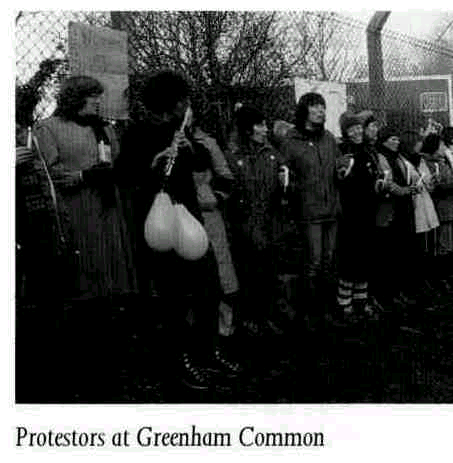
116 12 International relations
>
Is Britain really part of Europe?
The government says it is,
but look at this report from The Sunday Times of 18 April 1993.
Britain
bans EC medals
British members of the
European Community monitoring mission in former Yugoslavia have
been banned from a formal presentation of medals struck by the EC
to honour their bravery.
The British monitors have
been told that they may only receive the medals privately and keep
them as momentoes. They must never wear them on their uniforms
because of government rules against the acceptance of decorations
from 'foreign powers'.
" ... Many are angered
by the decision to count the EC as a foreign power.
has persisted. It
survived the Falklands War, when the USA offered Britain important
material help, but little public support, and regained its strength
in 1991 during the Gulf War against Iraq, when Britain gave more
active material support to the Americans than any other European
country. Public
feeling about the relationship is ambiguous. On the one hand, it is
reassuring to be so diplomatically close to the most powerful
nation in the world, and the shared language gives people some
sense of brotherhood with Americans. On the other hand, there is
mild bitterness about the sheer power of the USA. There is no
distrust, but remarks are often made about Britain being nothing
more than the fifty-first state of the USA. Similarly, while some
older people remember with gratitude the Americans who came to
their aid in two world wars, others resent the fact that it took
them so long to get involved!
In any case, the special
relationship has inevitably declined in significance since Britain
joined the European Community. In the world trade negotiations of
the early 1990s, there was nothing special about Britain's position
with regard to the USA - it was just part of the European trading
bloc. The opening of the Channel tunnel in 1994 has emphasized that
Britain's links are now mainly with Europe. Tourist statistics also
point this way. In 1993, for the first time, it was not American
visitors who arrived in the greatest numbers, it was the French,
and there were almost as many German visitors as Americans. The
majority of visitors to Britain are now from Europe.
The
sovereignty of the union: Europe When
the European Coal and Steel Community was formed in 1951, Britain
thought it was an excellent idea, but nothing to do with Britain!
Long years of an empire based on sea power meant that the
traditional attitude to Europe had been to encourage stability
there, to discourage any expansionist powers there, but otherwise
to leave it well alone. As
the empire disappeared, and the role of'the world's policeman' was
taken over by the USA, the British government decided to ask for
membership of the newly-formed European Communities. It took more
than ten years for this to be achieved (in 1973). From the very
start, the British attitude to membership has been ambiguous. On
the one hand, it is seen as an economic necessity and a political
advantage (increasing Britain's status as a regional power). The
referendum on continued membership in 1975 (the first in British
history) produced a two-to-one majority in favour. On the
other hand, acceptance does not mean enthusiasm. The underlying
attitude — that Britain is somehow special — has not really
changed and there are fears that Britain is gradually giving up its
autonomy. Changes in European
Europe 117,
>
The British sausage
Below is an extract from the
script of the BBC satirical comedy Yes, Prime Minister. It is part
of a speech made by James Hacker MP, in which he expresses
anti-European sentiments. It is fiction, of course, but it does
capture part of the British attitude to Europe. In the story,
Hacker's speech makes him so popular that he
becomes
the new Prime Minister! Notice
how, in the speech, sovereignty is not connected with matters
of conventional political power, but rather with matters of everyday
life and habits. (For the references to pints, yards, tanners etc,
see chapter 5.)
I'm a good European. I believe in Europe. I believe in the European
ideal! Never again shall we repeat the bloodshed of two World Wars.
Europe is here to stay.
But this does not mean that we have to bow the knee to every
directive from every bureaucratic Bonaparte in Brussels. We are a
sovereign nation still and proud of it. [applause] We have
made enough concessions to the European Commissar for ,; agriculture.
We have swallowed the wine lake, we have swallowed the butter
mountain, we have watched our French 'friends' beating up British
lorry drivers carrying good British lamb to the French public. We
have bowed and scraped, tugged our forelocks and turned the other
cheek. But I say enough is enough! [prolonged applause]
The Europeans have gone too far. They are now threatening the
British sausage. They want to standardize it — by which they mean
they'll force the British people to eat salami and bratwurst and
other garlic-ridden greasy foods that are totally alien to
the British way of life. [cries of 'hear hear', 'right on' and 'you
tell 'em, Jim'].
Do you want to eat salami for breakfast with your egg and bacon? I
don't. And I won't! [massive applause]
They've turned our pints into litres and our yards into metres, we
gave up the tanner and the threepenny bit, the two bob and the
half-crown. But they cannot and will not destroy the British
sausage! [applause and cheers]. Not while I'm here. [tumultuous
applause].
In the words of Martin Luther: Here I stand, I can do no other.
[Hacker sits down. Shot of large crowd rising to
its feet in appreciation]
domestic policy,
social policy or sovereignty arrangements tend to be seen in Britain
as a threat (> The British sausage). Throughout the 19805 and
1990S it has been Britain more than any other member of the European
Union (as it is now called) which has slowed down progress towards
further European unity. Meanwhile, there is a certain amount of
popular distrust of the Brussels bureaucracy.
This
ambiguous attitude can partly be explained by the fact that views
about Britain's position in Europe cut across political party lines.
There are people both for and against closer ties with Europe in
both the main parties. As a result, 'Europe' has not been promoted
as a subject for debate to the electorate. Neither party wishes to
raise the subject at election time because to do so would expose
divisions within that party (a sure vote-loser).
>
Up yours, Delors
This was the front page
headline of the
Sun, Britain's most popular newspaper, on i November 1990. It gives
voice, in a vulgar manner, to British dislike of the Brussels
bureaucracy. Jacques Delors was president of the European
Commission at the time. The expression 'up yours' is the spoken
equivalent of a rude, two-fingered gesture. Notice how the full
effect of the phrase is only possible if the French name 'Delors' is
pronounced in an English way, rhyming the second syllable of
'Delors' with 'yours'. Even serious, so-called 'quality' British
newspapers can sometimes get rather hysterical about the power
of Brussels. When, in 1991, the British government refused to agree
the social chapter in the Maastricht Treaty, The Sunday Times
published an article warning that the EU might still try to impose
the chapter on Britain. The headline described this possibility as
'Ambush'. >
The European history book
Sir Francis Drake is a
well-known English historical character. In 15-88 he helped to
defeat the Spanish Armada which was trying to invade England. Or did
he? Historians know that there was a terrible storm which broke up
the Spanish fleet.
In 1992 an EC history
'textbook' for secondary schools, written by a committee of
historians from every member state, was published. The first version
of the book decided that it was the weather which caused the failure
of the Spanish invasion, the second that it was Drake. The book was
published at the same time in Dutch, French, German, Greek, Italian
and Portuguese. But, strangely enough, no publisher for either a
British or a Spanish edition could be found.
118 12 International relations
>
Scotland
This was the front page of
the Sun's Scottish
edition on 2 3 January 1992, when it decided to support the
campaign for Scottish independence (see chapter18). The design
shows the cross of St Andrew, the national flag of Scotland.
>
Ulster
Ulster is the name often used
to describe the part of Ireland which is in the UK. It is the name
of one of the four ancient kingdoms of Ireland. (The others are
Leinster, Munster and Connaught). In fact, the British province
does not embrace all of Ulster's nine counties; three of its
counties belong to the republic. The name 'Northern Ireland' is not
used by some nationalists; they think it gives validity to an
entity which they do not recognize. One of the alternative
names they use is 'the six counties'
The
sovereignty of the union: Scotland and Wales There
is another reason for a distrust of greater European cohesion among
politicians at Westminster. It is feared that this may not just be
a matter of giving extra power to Brussels. It may also be a matter
of giving extra powers to the regions of Britain, especially its
different nations.
Until recently most Scottish people, although they insisted on many
differences between themselves and the English, were happy to be
part of the UK. But there has always been some resentment in
Scotland about the way that it is treated by the central government
in London. In the 1980s and early 1990s this resentment increased
because of the continuation in power of the Conservative party, for
which only around a quarter of the Scottish electorate had voted.
Opinion polls consistently showed that between half and
three-quarters of the Scottish population wanted either 'home rule'
(internal self-government) .within the UK or complete independence.
The realization that, in the EU, home rule, or even independence,
need not mean isolation has caused the Scottish attitude to Europe
to change. Originally, Scotland was just as cautious as England.
But now the Scottish, as a group, have become the most enthusiastic
Europeans in the UK. Scotland now has its own parliament which
controls its internal affairs and even has the power to vary
slightly the levels of income tax imposed by the UK government. It
is not clear whether complete independence will eventually follow,
but this is the policy of the Scottish National Party (SNP), which
is well represented in the new parliament.
In Wales, the situation is different. The southern part of this
nation is thoroughly Anglicized and the country as a whole has been
fully incorporated into the English governmental structure for more
than 400 years. Nationalism in Wales is felt mostly in the central
and northern part of the country, where it tends to express itself
not politically, but culturally (see chapter 4). Many people in
Wales would like to have greater control over Welsh affairs, but
not much more than some people in some regions of England would
like the same. Wales also now has its own assembly with
responsibility for many internal affairs. The
sovereignty of the union: Northern Ireland In
this section, the word 'Ulster' is used to stand for the British
province of Northern Ireland (> Ulster). Politics here is
dominated by the historic animosity
between the two communities there (see chapter 4). The Catholic
viewpoint is known as 'nationalist' or 'republican' (in support of
the idea of a single Irish nation and its republican government);
the Protestant viewpoint is known as 'unionist' or 'loyalist'
(loyal to the union with Britain).
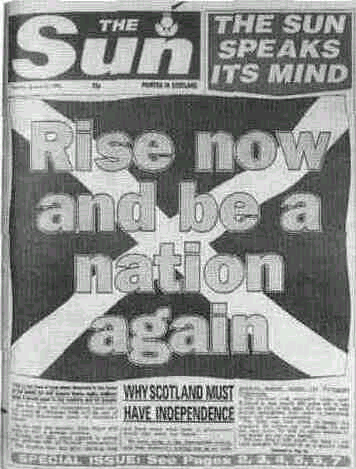
Northern Ireland 119
A
little modern history is necessary to explain the present
situation. By the beginning of the twentieth century, when Ireland
was still part of the United Kingdom, the vast majority of people
in Ireland wanted either home rule or complete independence from
Britain. Liberal governments in Britain had accepted this and had
attempted at various times to make it a reality. However, the one
million Protestants in Ulster were violently opposed to this idea.
They did not want to belong to a country dominated by Catholics.
They formed less than a quarter of the total population of the
country, but in Ulster they were in a 65% majority. After
the First World War the British government partitioned the country
between the (mainly Catholic) south and the (mainly Protestant)
north, giving each part some control of its internal affairs. But
this was no longer enough for the south. There, support for
complete independence had grown as a result of the British
government's savage repression of the 'Easter Rising' in 1916.
War followed. The eventual result was that the south became
independent of Britain. Ulster, however, remained within the United
Kingdom, with its own Parliament and Prime Minister. The
Protestants had always had the economic power in the six counties
(> Ulster). Internal self-government allowed them to take all
the political power as well. Matters were arranged so that
positions of official power were always filled by Protestants. In
the late 1960s a Catholic civil rights movement began. There was
violent Protestant reaction and frequent fighting broke out. In
1969 British troops were sent in to keep order. At first they were
welcomed, particularly among the Catholics. But troops, inevitably,
often act without regard to democratic rights. In the tense
atmosphere, the welcome disappeared. Extremist organizations
from both communities began committing acts of terrorism, such as
shootings and bombings. One of these groups, the Provisional
IRA (> Extremist groups), then started a bombing campaign on the
British mainland. In response, the British government reluctantly
imposed certain measures not normally acceptable in a modern
democracy, such as imprisonment without trial and the outlawing of
organizations such as the IRA. The application of these
measures caused resentment to grow. There was a hardening of
attitudes in both communities and support for extremist political
parties increased. There
have been many efforts to find a solution to 'the troubles' (as
they are known in Ireland). In 1972 the British government decided
to rule directly from London. Over the next two decades most of the
previous political abuses disappeared, and Catholics now have
almost the same political rights as Protestants. In addition, the
British and Irish governments have developed good relations and new
initiatives are presented jointly. The troubles may soon be
over. However, despite reforms, inequalities remain. At the time of
writing, unemployment among Ulster's Catholics is the highest of
>
Extremist groups
The most well-known
republican group is the IRA (Irish Republican Army). Seventy years
ago this name meant exactly what it says. The IRA was composed of
many thousands of people who fought for, and helped to win, Irish
independence. Members of the modern IRA are also known as "the
Provisionals'. They are a group that split off from the 'official'
IRA in the 1960s. They have used a name that once had great appeal
to Irish patriotic sentiments. In fact, the IRA has little support
in the modem Irish Republic and no connection at all with its
government.
The most well-known loyalist
groups are the UFF (Ulster Freedom Fighters), theUVF (Ulster
Volunteer Force) and the UDA (Ulster Defence Association).
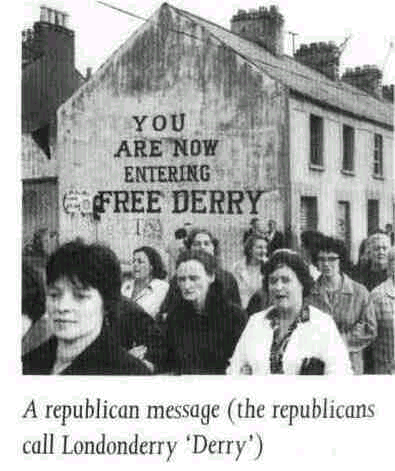

120 12 International relations
any area in the UK, while that among its Protestants is one of the lowest. Members of the police force, the Royal Ulster Constabulary (RUC), are still almost entirely Protestant. Most of all, the basic divisions remain. The Catholics identify with the south. Most of them would like the Irish government in Dublin to have at least a share in the government of Ulster. In 1999 the Republic removed the part of its constitution which included a claim to the six counties. This has calmed Protestant fears about being swallowed up. In return for its gesture, the Republic now has a role to play in a number of all-Ireland bodies which have been set up. Some Protestants still have misgivings about this initiative. It should be noted here that the names 'loyalist' and 'unionist' are somewhat misleading. The Ulster Protestants are distinct from any other section of British society. While it is important to them that they belong to the United Kingdom, it is just as important to them that they do not belong to the Republic of Ireland. From their point of view, and also from the point of view of some Catholics, a place for Ulster in a federated Europe is a possible solution.
In Ulster there is now a general disgust at the activities of extremists, and a strong desire for peace. At the time of writing, nearly all terrorist activities have ceased and a Northern Ireland government which includes representatives of all political views has been set up.
QUESTIONS
1 What indications can you find in this chapter that British people like to think of their country as an important and independent power in the world?
2 Would you say that the British people feel closer to the USA or the European Union? What evidence do you have for your view?
3 The people of Scotland have changed from being 'anti-Europe' to being 'pro-Europe' in the last twenty years of the twentieth century. Why?
4 In 1994, Prime Minister John Major announced that he would like to hold a referendum in Ulster on that area's future constitutional position. Some people said that the referendum should include the whole of Ireland. Which people do you think they were? Why did they say this?
5 Do you think that the present boundaries of the UK should remain as they are or should they change? Do you think they will stay as they are?
SUGGESTIONS
• A Passage to India by E M Forster is set in India at the height of the British Empire and reflects colonial attitudes. (There is also a film of the book.) The Raj Quartet, by Paul Scott (originally four novels, but published in a combined version under this title) is similarly set in India, but in the last years of British rule in the 1940s.
13 Religion
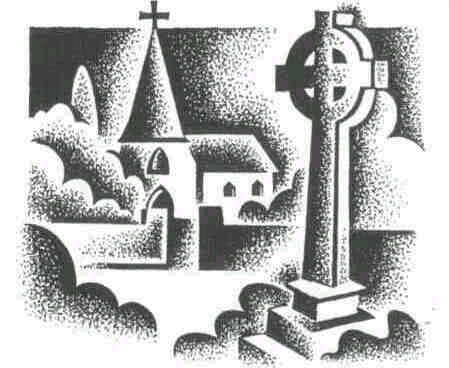
The vast majority of
people in Britain do not regularly attend religious services. Many
do so only a few times in their lives. Most people's everyday
language is no longer, as it was in previous centuries, enriched by
their knowledge of the Bible and the English Book of Common Prayer.
It is significant that the most familiar and well-loved English
translation of the Bible, known as the King James Bible, was
written in the early seventeenth century and that no later
translation has achieved similar status. It
therefore seems that most people in Britain cannot strictly be
described as religious. However, this does not mean that they have
no religious or spiritual beliefs or inclinations. Surveys have
suggested that nearly three-quarters of the population believe
in God and between a third and a half believe in concepts such as
life after death, heaven and hell (and that half or more of the
population believe in astrology, parapsychology, ghosts and
clairvoyance). In addition, a majority approve of the fact that
religious instruction at state schools is compulsory. Furthermore,
almost nobody objects to the fact that the Queen is queen 'by the
grace of God', or the fact that she, like all previous British
monarchs, was crowned by a religious
>
Religious participation in Britain
Here are two graphs showing
the extent of active participation in organized religion in 1990
and the change in these numbers from five years before. Of course,
what exactly is meant by 'active participation' can vary.
Nevertheless, the figures give a reasonably accurate picture. The
category 'Independent Christian' denotes the various charismatic
and Pentecostalist groups mentioned in the text.
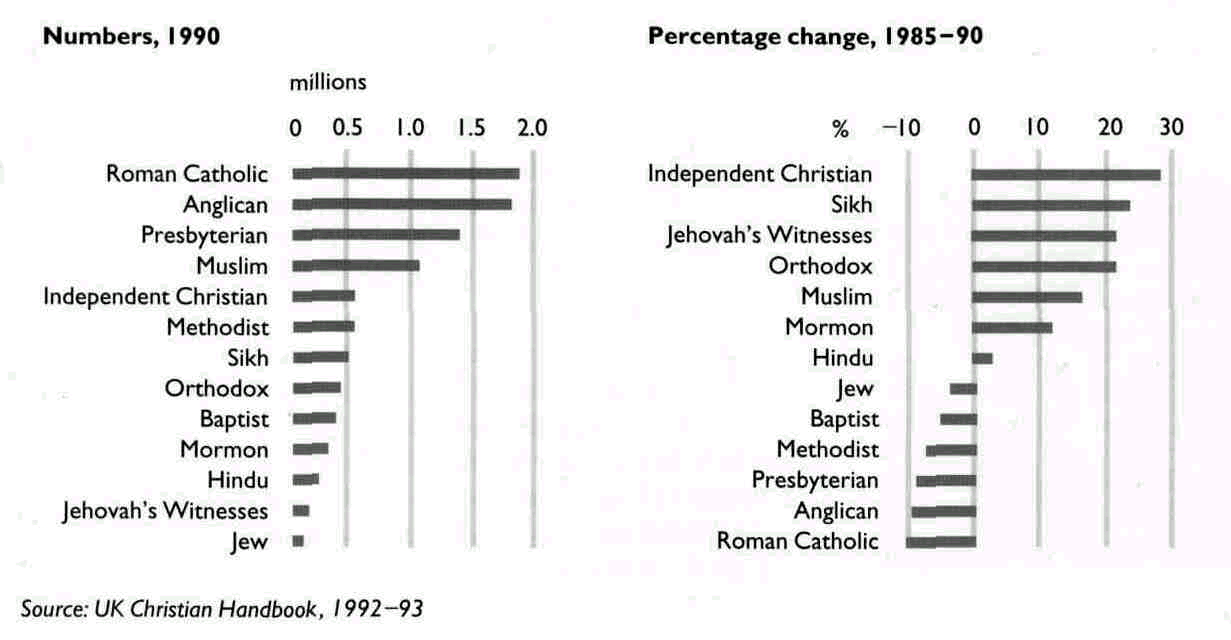
122 13 Religion
>
The road to tolerance
Until 1828 nonconformists
were not allowed to hold any kind of government post or public
office or even to go to university. Excluded from public life, many
developed interests in trade and commerce as an outlet for their
energies and were the leading commercial figures in the industrial
revolution. For example, all the big British chocolate
manufacturing companies were started by Quaker families (note
also the well-known 'Quaker' brand of cereals).
Catholics were even worse
off, having to worship in secret, or, later, at least with
discretion. The last restriction on their freedom was lifted in
1924, when bells to - announce the celebration of Catholic
Mass were allowed to ring as long as they liked (previously, Mass
had to be announced with a single chime of the bell only).
Catholics were given the right to hold public office in 1829. There
is still a law today which forbids Catholic priests to sit in
Parliament (though it is doubtful that any would want to!).
figure (the Archbishop
of Canterbury) in a church (Westminster Abbey) and that the British
national anthem (God Save Our Queen) invokes God's help in
protecting her. The
general picture, as with so many aspects of British life, is of a
general tolerance and passive approval of the status quo. The
majority attitude towards organized religion is rather similar to
that towards the monarchy. Just as there is no serious republican
movement in the country, so there is no widespread
anti-clericalism. And just as there is no royalist movement either,
so most people are not active participants in organized
religion, but they seem to be glad it is there! Religion
and politics Freedom
of religious belief and worship (and also the freedom to be a
non-believer) is taken for granted in modern Britain. With the
notable exception of Northern Ireland (see chapter 4), a person's
religion has almost no political significance. There are no
important 'Christian' or anti-clerical political parties. Except
perhaps for Muslims, there is no recognizable political pressure
group in the country which is based on a particular religious
ideology. To describe oneself as 'Catholic' or 'Church of England'
or 'Methodist' or any other recognized label is to indicate one's
personal beliefs but not the way one votes. The
religious conflicts of the past and their close relationship with
politics (see chapter 2) have left only a few traces in modern
times, and the most important of these are institutional rather
than political: the fact that the
monarch cannot, by law, be a Catholic; the fact that the twenty-six
senior bishops in one particular church (the Church of England) are
members of the House of Lords (where they are known as the 'Lords
Spiritual'); the fact that the government has the right of veto on
the choice of these bishops; the fact that the ultimate authority
for this same church is the British Parliament. These facts point
to a curious anomaly. Despite the atmosphere of tolerance and the
separation of religion and politics, it is in Britain that we find
the last two cases in Europe of'established' churches, that is
churches which are, by law, the official religion of a country.
These cases are the Church of Scotland (see 'other Christian
denominations' below) and the Church of England. The monarch is the
official head of both, and the religious leader of the latter, the
Archbishop of Canterbury, is appointed by the government.
However, the privileged position of the Church of England (also
known as the Anglican Church) is not, in modern times, a political
issue. Nobody feels that they are discriminated against if they do
not belong to it. In any case, the Anglican Church, rather like the
BBC (see chapter 16), has shown itself to be effectively
independent of government and there is general approval of this
independence. In fact, there is a modern politics-and-religion
debate, but now it is the other way around. That is, while it is
accepted that politics should
Anglicanism 123
>
The Christian churches in Britain
The organization of the
Anglican and Catholic churches is broadly similar. At the highest
level is an archbishop, who presides over a province. There are
only two of these in the Church of England, Canterbury and
York. The senior Catholic archbishopric is Westminster and its
archbishop is the only cardinal from Britain. At the next level is
the diocese, presided over by a bishop. In the Anglican Church
there are other high-ranking positions at the level of the
diocese, whose holders can have the title dean, canon or
archdeacon. Other Christian churches do not have such a
hierarchical organization, though the Methodists have a system of
circuits.
At the local level, the terms
verger, warden and sexton are variously used for lay members of
churches (i.e. not trained clergy) who assist in various ways
during, services or with the upkeep of the church. Note also that a
priest who caters for the spiritual needs of those in some sort of
institution (for example, a university or a hospital) is
called a chaplain.
stay
out of religion, it is a point of debate as to whether religion
should stay out of politics. The
Anglican Church used to be half-jokingly described as 'the
Conservative party at prayer'. This reputation was partly the
result of history (see chapter 6) and partly the result of the fact
that most of its clergy and regular followers were from the higher
ranks of society. However, during the 1980s and early 1990s it was
common for the Church to publicly condemn the widening gap between
rich and poor in British society. Its leaders, including the
Archbishop of Canterbury himself, repeatedly spoke out against this
trend, implying that the Conservative government was largely to
blame for it - despite comments from government ministers that
politics should be left to the politicians. The Archbishop also
angered some Conservative Anglicans when, at the end of the
Falklands/Malvinas War in 1982, he did not give thanks to God for a
British victory. Instead, he prayed for the victims of the war on
both sides. In
1994 the Catholic Church in Britain published a report which
criticized the Conservative government. Since the general outlook
of Britain's other conventional Christian denominations has always
been anti-Conservative, it appears that all the country's major
Christian churches are now politically broadly left of centre. Anglicanism Although
the Anglican Church apparently has much the largest following
in England, and large minorities of adherents in the other nations
of Britain, appearances can be deceptive. It has been estimated
that less than 5% of those who, if asked, might describe themselves
as Anglicans regularly attend services. Many others are christened,
married and buried in Anglican ceremonies but otherwise hardly ever
go to church. Regular attendance for many Anglicans is tradition-
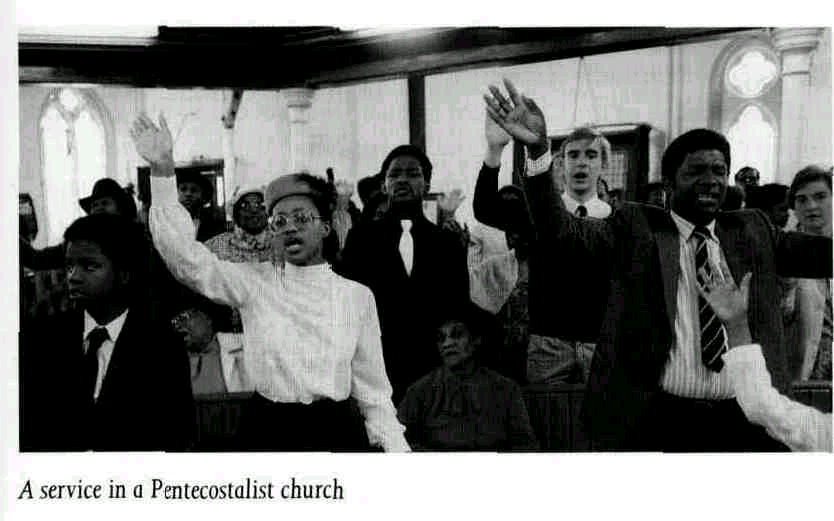
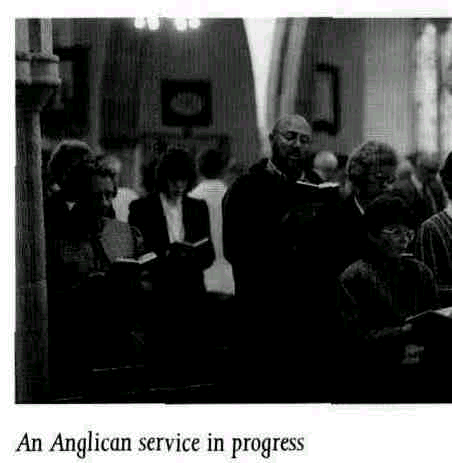
124 13 Religion
>
Women priests
On Wednesday 11 November
1992, at
Eve in the evening, Dr George Carey, the Archbishop of Canterbury,
rose to announce a momentous decision. By just two votes more than
the required two-thirds majority, the General Synod of the Anglican
Church (its governing body) had voted to allow the ordination
of women priests. The debate in the Synod had lasted more than six
hours, and had been going on for years before that, both inside and
outside the church, all over the country.
About eighteen months
afterwards, the first women priests were ordained. Those who
support this development believe that it will help to give the
Church of England a greater relevance to the modern world and
finally bring it up to date. (Unlike the Catholic Church, it has
always allowed its clergy to be married.) Some who were opposed to
the change have not accepted the Synod's decision, and there are a
few local cases of attempts to set up a rebel church. Some members
of the Anglican Church have decided to 'go over to Rome' - that is,
to join the Catholic Church, which does not have women priests.
ally as much a social
as a religious activity, and predominantly one for the upper and
middle classes. The
doctrine of the Church of England was set out in the sixteenth
century, in a document called the Thirty-Nine Articles. However,
the main motivation for the birth of Anglicanism was more patriotic
and political than doctrinal (see chapter 2). As a result, it has
always been what is called a 'broad church', willing to accommodate
a wide variety of beliefs and practices. For example, the nature of
its religious services varies quite widely from church to
church, depending partly on the inclinations of the local priest
and partly on local tradition. Three
main strands of belief can be identified. One strand is
evangelical, or 'low church'. This places great emphasis on
the contents of the Bible and is the most consciously opposed to
Catholicism. It therefore adheres closely to those elements of the
Thirty-Nine. Articles that reject Papal doctrines and is suspicious
of the hierarchical structure of the Church. It prefers plain
services with a minimum of ceremony. In contrast, the beliefs of
the 'Anglo-Catholic', or 'high church', strand are virtually
identical to those of Catholicism - except that it does not accept
the Pope as the ultimate authority. High church services are more
colourful and include organ music and elaborate priestly clothing.
Both these strands are traditional in their outlook. But there is
also a liberal wing, which is willing to question some of the
traditional Christian beliefs, is more inclined to view the Bible
as merely a historical document, is more tolerant towards
homosexuality and was the first to support moves to ordain
women priests (> Women priests). But
to many, perhaps most, of its members, it is the 'Englishness' of
the Anglican Church which is just as important as its religious
doctrine. This is what gives it meaning and holds its various
strands together. Without it, many Anglo-Catholics would be
Catholic, many low churchers and liberals would form their own
sects or join existing nonconformist groups (see below), and a very
large number would simply cease to have anything to do with
organized religion at all. Perhaps this is why an opinion poll in
the 1980s showed that most people, displaying apparently
uncharacteristic intolerance, approve of the law that does not
permit a Catholic monarch. At
present, this national distinctiveness is emphasized by the
Anglican Church's position as the official religion. It has
been argued that the tie between Church and State should be broken;
that is, that the Church should be disestablished so that, after
losing its extreme members to other churches, it could spend less
time on internal disagreement and more on the moral and spiritual
guidance of its remaining members. Those who are against this move
fear that it would cause the obvious Englishness of the Church to
disappear and thus for the number of its adherents to drop sharply.
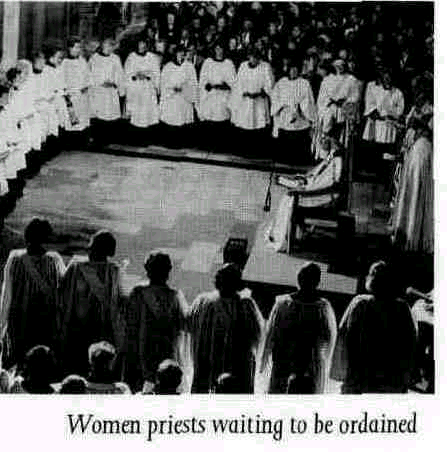
Catholicism 125
Catholicism After
the establishment of Protestantism in Britain (see chapter 2),
Catholicism was for a time an illegal religion and then a barely
tolerated religion. Not until 1850 was a British Catholic hierarchy
reestablished. Only in the twentieth century did it become
fully open about its activities. Although Catholics can now be
found in all ranks of society and in all occupations, the
comparatively recent integration of Catholicism means that they are
still under-represented at the top levels. For example, although
Catholics comprise more than 10% of the population, they comprise
only around 5% of MPs.
A large proportion of Catholics in modern Britain are those whose
family roots are in Italy, Ireland or elsewhere in Europe. The
Irish connection is evident in the large proportion of priests in
England who come from Ireland (they are sometimes said to be
Ireland's biggest export!).
Partly because of its comparatively marginal status, the Catholic
Church, in the interests of self-preservation, has maintained a
greater cohesiveness and uniformity than the Anglican Church. In
modern times it is possible to detect opposing beliefs within it
(there are conservative and radical/liberal wings), but there is,
for example, more centralized control over practices of worship.
Not having had a recognized, official role to play in society, the
Catholic Church in Britain takes doctrine and practice (for
example, weekly attendance at mass) a bit more seriously than it is
taken in countries where Catholicism is the majority religion - and
a lot more seriously than the Anglican Church in general does.
This comparative dedication can be seen in two aspects of Catholic
life. First, religious instruction is taken more seriously in
Catholic schools than it is in Anglican ones, and Catholic schools
in Britain usually have a head who is either a monk, a friar or a
nun. Second, there is the matter of attendance at church. Many
people who hardly ever step inside a church still feel entitled to
describe themselves as 'Anglican'. In contrast, British people who
were brought up as Catholics but who no longer attend mass
regularly or receive the sacraments do not normally describe
themselves as 'Catholic'. They qualify this label with 'brought up
as' or 'lapsed'. Despite being very much a minority religion in
most places in the country, as many British Catholics regularly go
to church as do Anglicans.
>
Episcopalianism
The Anglican Church is the
official state religion in England only. There are, however,
churches in other countries (such as Scotland, Ireland, the USA and
Australia) which have the same origin and are almost identical to
it in their general beliefs and practices. Members of these
churches sometimes describe themselves as 'Anglican'. However,
the term officially used in Scotland and the USA is 'Episcopalian'
(which means that they have bishops), and this is the term which is
often used to denote all of these churches, including the Church of
England, as a group.
Every ten years the bishops
of all the Episcopalian churches in the world gather together in
London for the Lambeth Conference, which is chaired by the
Archbishop of Canterbury.
Despite the name
'Canterbury', the official residence of the head of the Church of
England is Lambeth Palace in London.
126 13 Religion
>
Keeping the sabbath
In the last two centuries,
the influence of the Calvinist tradition has been felt in laws
relating to Sundays. These laws have recently been relaxed, but
shop opening hours, gambling and professional sport on Sundays are
still all restricted in small ways. In some places in rural Wales,
where nonconformism is traditionally strong, Sundays are still
'dry';
that is, the pubs stay
closed.
Other
conventional Christian churches In
many ways, Anglicanism represents a compromise between
Protestantism and Catholicism. Its stated doctrine, which rejects
the authority of the Pope and other important aspects of Catholic
doctrine, is Protestant. But its style, as shown by its
hierarchical structure and its forms of worship, is rather
Catholic. When
Protestantism first took root in Britain, there were many people
who rejected not only Catholic doctrine but also 'Romish' style.
These people did not join the newly-established Anglican Church.
They regarded both the authority given to its clergy and its
continuation of orthodox ritual as obstacles to true worship.
Instead, they placed great importance on finding the truth for
oneself in the words of the Bible and on living an austere life of
hard work and self-sacrifice. They disapproved of the pursuit of
pleasure and therefore frowned on public entertainments such as the
theatre^ on drinking, on gambling and on any celebration of the
sexual aspect of life. This
is the origin of the Puritan/Calvinist tradition in Britain (see
chapter 2). The first church within this tradition was the
Presbyterian Church. In Scotland, this form of Protestantism was so
strong that it became the nation's established church. The Church
of Scotland has a separate organization from the Anglican Church.
It has no bishops. Its head, or 'Moderator', is elected by its
general assembly. It is the biggest religion in Scotland, where it
is often known simply as 'the kirk' (the Scots word for 'church').
There are also many Presbyterians in England and a large number in
Northern Ireland. In
England, those Protestants who did not accept the authority of the
Anglican Church were first known as 'dissenters' and later, as
|
> What is it called?
|
|||
|
|
Anglican
|
Catholic
|
Presbyterian and other nonconformist
|
|
Local unit
|
parish
|
parish
|
congregation
|
|
Place of worship
|
church
|
church
|
chapel kirk' meeting house2
|
|
Clergy
|
vicar/rector/parson3 priests curate4
|
priest
|
minister pastor
|
|
New member of clergy
|
deacon
|
novice
|
|
|
Residence of clergy
|
vicarage rectory
|
|
manse'
|
' Church of Scotland only
2 Mainly Quaker
3 One of these is used when referring to an individual; "priests' is used collectively.
4 A junior member of the clergy
Other religions 127
tolerance grew, as
'nonconformists'. These days, when refusal to conform to the
established church is irrelevant, they are simply called 'members
of the free churches'. A great many different free-church groups
have come into being over the centuries. In the details of their
organization, styles of worship and doctrinal emphasis, the various
nonconformist groups differ considerably. However, they all share,
in varying degrees, certain characteristics: they regard
simplicity and individual prayer as more important than
elaborate ritual and public ceremony; there is comparatively little
difference between their clergy (if they have any at all) and their
lay members; they praise self-denial, although to a lesser extent
than the original Puritans. For example, many are teetotal (their
members do not drink alcohol).
After Presbyterians, the largest traditional nonconformist group in
Britain is the Methodist Society. Methodists follow the teachings
of John Wesley, an eighteenth century preacher who started his
career as an Anglican clergyman. He had little doctrinal
disagreement with the established church. However, he and his
followers considered that it did not care enough about the needs of
ordinary people and that its hierarchy was not serious enough about
the Christian message. The Salvation Army (see chapter 18) grew out
of the Wesley an movement.
Two other nonconformist groups with a long history are the Baptists
and the Quakers. The former are comparatively strict both in their
interpretation of the Bible and in their dislike of worldly
pleasures. The latter, also known as the Society of Friends,
are a very small group whose notable characteristics are their
complete lack of clergy and their pacifism. They refuse to fight in
any war, though they will do ambulance and hospital work. Other
religions, churches and religious movements Since
it is a multicultural country where the pressure to conform is
comparatively weak, Britain is home to followers of almost every
religion and sect imaginable. Some of these are offshoots, or local
combinations, of those already mentioned. For example, the only
Church of distinctly Welsh origin calls itself both 'Calvinistic
Methodist' and 'Presbyterian Church of Wales'. The
numbers of followers of all the traditional Christian churches have
been slowly but steadily declining in the second half of the
twentieth century. Other Christian sects and churches have been
growing. Because of their energetic enthusiasm and their desire to
attract new followers, they are sometimes characterized by the term
'evangelical'. Most of them are similar to traditional
nonconformist groups in that they avoid rigid ritual and place
great emphasis on scripture. In the case of some groups, their
interpretations of the Bible are often literal: the Mormons,
Jehovah's Witnesses and Seventh Day Adventists (all of which
originated in the USA) are examples. These groups, and others, also
provide a strict code of behaviour for their followers.
Ecumenicalism This
term is used to describe the trend in the last half of the
twentieth century towards greater co-operation, and even
unity, among the various Christian churches in Britain. Cynics say
that this spirit is the result of the fact that active
participation in any form of Christianity has become the
activity of a rather small minority. However, the churches
themselves are quite sincere about it. With political and social
divisions far enough behind them, they find that they do indeed
have a lot in common. The
only actual union that ecumenicalism has yet produced is the
unification of Presbyterians and Congregationalists, who, in 1972,
became the United Reformed Church. Anglicans and Methodists came
very close (but not quite close enough) to a union in 1968. The
possibility of the Anglican Church rejoining world Catholicism
seems to have receded since the introduction of women priests.
>
Church of Wales?
There is no Welsh equivalent
of the Church of England or the Church of Scotland. That is to say,
Wales has no officially established Church. The Anglican Church was
disestablished in Wales, where it has always had only a tiny
following, in 1914. Wales is predominantly nonconformist.
128 13 Religion
>
As quiet as a church mouse
Conventional church services
in Britain are typically very quiet, except when hymns are being
sung. British people attending church services abroad have often
been amazed, even shocked, by the noisiness and liveliness of the
congregation. They chatter among themselves, they walk in and
out... In Britain, respect and reverence have traditionally been
expressed by silence and stillness. Many people, however, find the
atmosphere at traditional services rather repressive and
unwelcoming. This could help to explain the trend towards
evangelical and charismatic Christian churches.
The
fastest-growing type of evangelical Christianity, however, places
less emphasis on dogma, sin, or giving people a code of behaviour.
Instead, the emphasis is on the spiritual and miraculous; on revelation.
Gatherings often involve joyful singing. There is a belief in
spiritual healing of the sick. The oldest existing church of this
type in Britain is called Pentecostal, and this term is sometimes
used to denote all such groups. Pentecostalism has had a small
working-class following for many years. Its recent growth is among
the middle class. Many groups began "with meetings in people's
living rooms, where formality is at a minimum. Another term
sometimes used of these groups is 'charismatic', reflecting both
their enthusiasm and their emphasis on the miraculous. The growth
of these groups might indicate that many British people feel a gap
in their lives which neither the material benefits of modern life
nor the conventional churches can fill.
Some people are turning even further
afield, beyond the bounds of the Christian tradition. The term 'New
Age' is used to cover a very wide range of beliefs which can
involve elements of Christianity, eastern religions and ancient
pagan beliefs all mixed in together. Interests and beliefs of
this kind are not new in Britain. Theosophy, Druidism, Buddhism,
Christian Scientism (which believes in the control of the body
through the mind) and many other beliefs have all had their
followers in this country for a hundred years or more. Until the
196os such people came exclusively from a small set of the upper
middle class. Since then, however, New Age beliefs have filtered
downwards to other sections of the social scale. Despite their
great variety and lack of exclusiveness, two features seem to be
common to all New Age beliefs: first, an emphasis on personal
development (often seen as spiritual development); second,
respect for the natural environment.
The
remaining religious groups with significant numbers of followers
in Britain are all associated with racial minorities. The most
well-established of these are the Jews. Anti-Semitism exists in
Britain, but for a long time it has been weaker than it is in most
other parts of Europe. The security and confidence of Judaism in
Britain can be seen both in the healthy proportion of Jews in
Parliament and in the fact that within it there is, quite openly,
the same struggle between orthodox/conservative and liberal/radical
viewpoints as there is in the Anglican and Catholic churches. The
numbers of followers of the Christian Orthodox, Sikh, Hindu and
Muslim religions are all growing, mainly because of high birth
rates among families belonging to them. The last of these is by far
the largest. Its continued growth is also for another reason.
Relative poverty, racial discrimination and occasional conflicts
with the authorities have caused people brought up as Muslims to be
politicized - more so than any other religious group in the
country. As a result, young Muslims are less likely to drift away
from their religion
Other religions 12 9
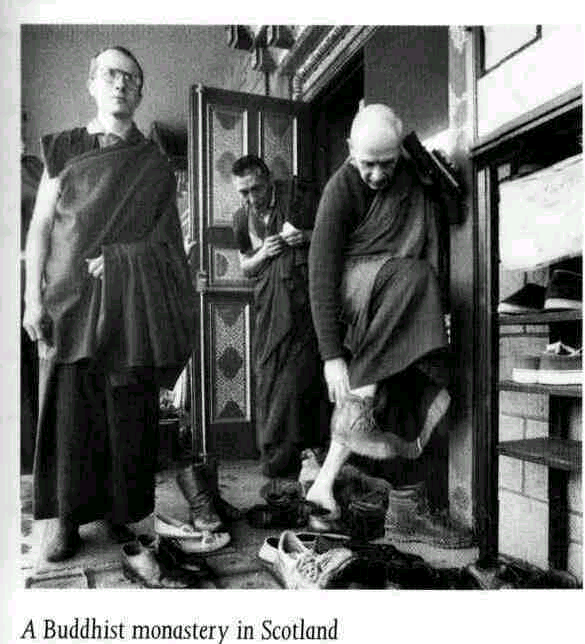
In February 1993 thirty-five monks emerged from a four-year retreat. It was a very strict retreat. The monks never left their sleeping quarters. They spent most of their time meditating in wooden boxes, the same boxes in which they slept. They never once listened to the radio, watched television or read a newspaper.
If you know something about religion, you will not be surprised to learn that these monks were Tibetan Buddhists and that the name of the monastery in which the retreat took place is Samye Ling. But what you may be surprised to learn is that Samye Ling is in Eskdalemuir, near Lockerbie, in Scotland. It was set up in 1968 when a group of Tibetan monks arrived in the area. They soon collected a large number of European followers and set them to work building Europe's largest Buddhist temple. Since then, Samye Ling has continued to attract new followers. So many Buddhists now live in the area that in 1993 the local primary school had only one Christian pupil.
than the young of other faiths. One example of conflict is the Salman Rushdie affair (see chapter 6). Another is the question of Muslim schools. There have been both Catholic and Jewish state schools for some time now. The country's Muslims are demanding the same opportunity.
Finally, it is necessary to mention what are called 'cults'. The beliefs of these groups vary so widely that it is impossible to generalize about them. What they seem to have in common is the style of their belief, involving absolute commitment to and unquestioning obedience of the leader around whom they are centred (it is often only in this sense that they can be called religions). Cults have a bad reputation for using mind-control techniques. Their extremist tendencies are often offensive to most people and, with a few exceptions, each individual cult is tiny. However, it has been estimated that there are between 500 and 700 of them in the country and that, taken together, they have nearly half a million followers.
QUESTIONS
1 What reasons have been put forward for disestablishing the Anglican Church? What are the arguments in favour of keeping it in its favoured position?
2 In what ways, and to what extent, can different churches and religions in Britain be associated with particular geographical areas and particular social classes?
3 How does the relation between religion and politics differ between your country and Britain?
4 It could be argued that in both the nature of their services and their general attitude, the charismatic churches are surprisingly un-British in their approach to religion, m contrast, it could be said that the general attitude of the New Age movement fits quite comfortably into the traditional British approach. Do you agree?
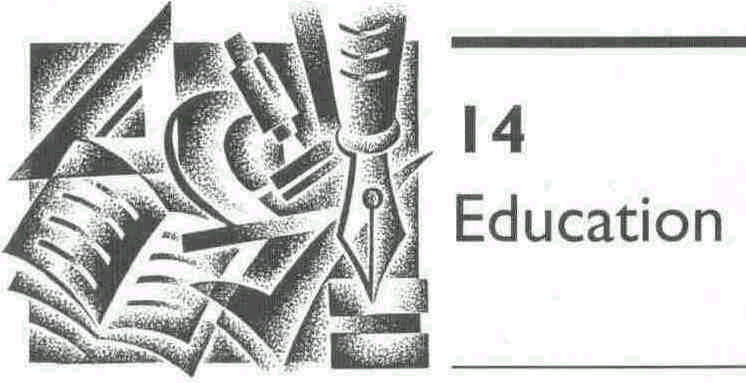
>
Public means private!
Terminology to do with the
school system in Britain can be confusing. Schools funded by the
government, either directly or via local education authorities, are
called 'state schools' and education provided in this way is known
as 'state education'. This distinguishes it from 'private
education', which comprises 'independent schools'. Some
independent schools (a varying number, because the term is not
exact) are known as "public schools'.
The possibility of confusion
is especially great because in the USA schools organized by the
government are called 'public schools' and the education
provided by the government is called the 'public school
system'.
In Britain today, about 8% of
children are educated outside the state system.
The basic features of
the British educational system are the same as they are anywhere
else in Europe: full-time education is compulsory up to the middle
teenage years; the academic year begins at the end of summer;
compulsory education is free of charge, but parents may spend money
on educating their children privately if they "want to (>
Public means private!). There are three recognized stages, with
children moving from the first stage (primary) to the second stage
(secondary) at around the age of eleven or twelve. The third
(tertiary) stage is 'further' education at university or college.
However, there is quite a lot which distinguishes education in
Britain from the way it works in other countries. Historical
background The
British government attached little importance to education until
the end of the nineteenth century. It was one of the last
governments in Europe to organize education for everybody. Britain
was leading the world in industry and commerce, so, it was felt,
education must somehow be taking care of itself. Today, however,
education is one of the most frequent subjects for public debate in
the country. To understand the background to this debate, a little
history is needed. Schools
and other educational institutions (such as universities) existed
in Britain long before the government began to take an interest in
education. When it finally did, it did not sweep these institutions
away, nor did it always take them over. In typically British
fashion, it sometimes incorporated them into the system and
sometimes left them outside it. Most importantly, the government
left alone the small group of schools which had been used in the
nineteenth century (and in some cases before then) to educate the
sons of the upper and upper-middle classes. At these 'public'
schools (> The public school system), the emphasis was on
'character-building' and the development of' team spirit'
rather than on academic achievement. This involved the development
of distinctive customs and attitudes, the wearing of distinctive
clothes and the use of specialized items of vocabulary. They were
all 'boarding schools' (that is, the pupils lived in them), so they
had a deep and lasting influence on their pupils. Their aim was to
prepare young men to take up positions in the higher ranks of the
army, in business, the legal profession, the civil service and
politics.
Historical background 131
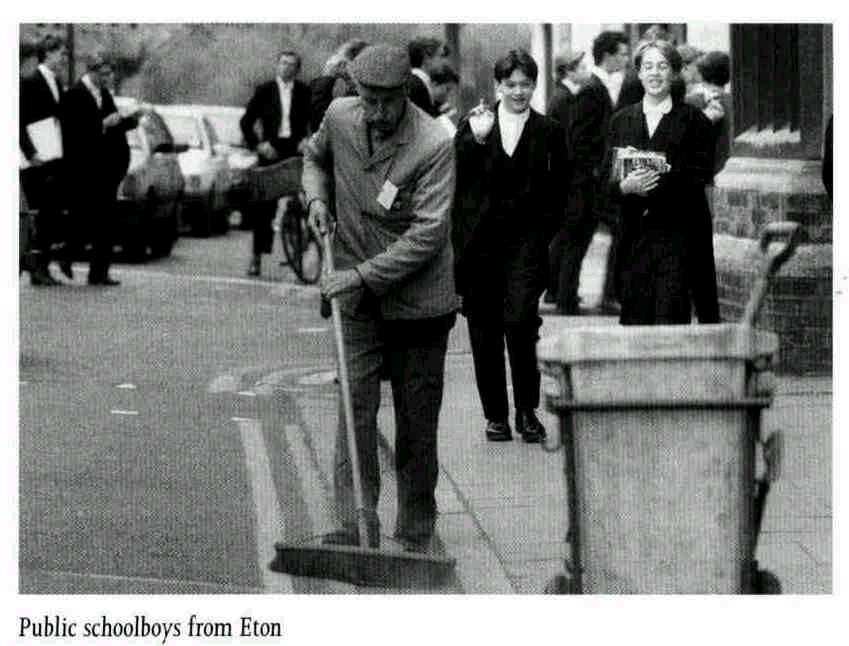
Stereotypical public schools:
• are for boys only from the age of thirteen onwards, most of whom attended a private 'prep' (= preparatory) school beforehand;
• take fee-paying pupils (and some scholarship pupils who have won a place in a competitive entrance exam and whose parents do not pay);
• are boarding schools (the boys live there during term-time);
• are divided into 'houses', each 'house' being looked after by a 'housemaster';
• make some of the senior boys 'prefects', which means that they have authority over the other boys and have their own servants (called 'fags'), who are appointed from amongst the youngest boys;
• place great emphasis on team sports;
• enforce their rules with the use of physical punishment;
• have a reputation for a relatively great amount of homosexual activity;
• are not at all luxurious or comfort-| able.
However, this traditional image no longer fits the facts. These days, there is not a single public school in the
country in which all of the above features apply. There have been a fairly large number of girls' public schools for the last hundred years, and more recently a few schools have started to admit both boys and girls. Many schools admit day pupils as well as boarders, and some are day-schools only; prefects no longer have so much power or have been abolished altogether; fagging has disappeared;
there is less emphasis on team sport
and more on academic achievement;
life for the pupils is more physically comfortable than it used to be.
Among the most famous public schools are Eton, Harrow, Rugby and Winchester.
When
the pupils from these schools finished their education, they formed
the ruling elite, retaining the distinctive habits and vocabulary
"which they had learnt at school. They formed a closed group,
to a great extent separate from the rest of society. Entry into
this group was difficult for anybody who had had a different
education. When, in the twentieth century, education and its
possibilities for social advancement came within everybody's reach,
new schools tended to copy the features of the public schools.
(After all, they provided the only model of a successful school
that the country had.) Many
of the more distinctive characteristics of British education
outlined below can be ascribed, at least partly, to this historical
background. Of more recent relevance is Britain's general loss of
confidence in itself (see chapters 4 and 6). This change of mood
has probably had a greater influence on education than on any other
aspect of public life (> Looking towards Germany). The modern
educational system has been through a period of constant change and
it is difficult to predict what further changes will occur in the
next decade. At the same time, however, there are certain
underlying characteristics that seem to remain fixed.
>
Looking towards Germany
The accepted wisdom in modern
Britain is that the education systems of many other countries are
better than the British one, especially the German system. Queen
Victoria was known to have remarked on this in the nineteenth
century. But that, of course, was in the days when Britain ruled
the world, so who cared?
These days, however, the
British take their inadequacies seriously. In 1991 The Economist
reported that pilgrimages to Germany from British
educationalists, education ministers and business people had become
so common that the British embassy in Bonn employed a full-time
official to look after these visitors and put them in touch with
the right educational experts.
132 14 Education
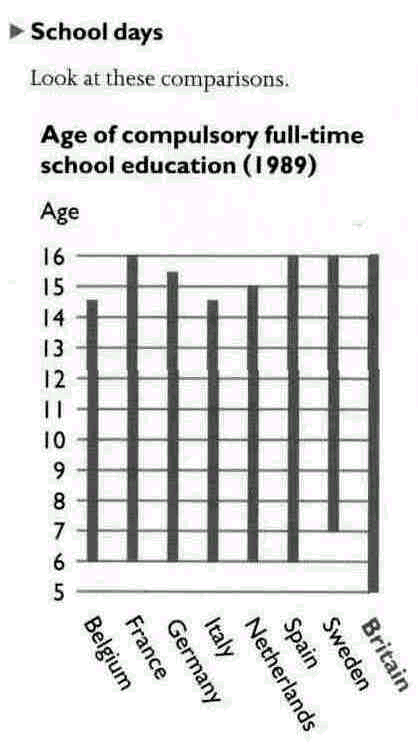
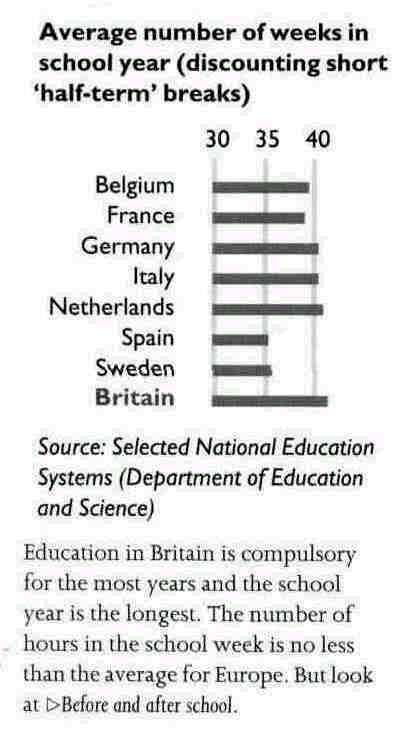
Despite recent changes, it is a characteristic of the British system that there is comparatively little central control or uniformity. For example, education is managed not by one, but by three, separate government departments: the Department for Education and Employment is responsible for England and Wales alone - Scotland and Northern Ireland have their own departments. In fact, within England and Wales education has traditionally been seen as separate from 'training', and the two areas of responsibility have only recently been combined in a single department.
None of these central authorities exercises much control over the details of what actually happens in the country's educational institutions. All they do is to ensure the availability of education, dictate and implement its overall organization and set overall learning objectives (which they enforce through a system of inspectors) up to the end of compulsory education.
Central government does not prescribe a detailed programme of learning or determine what books and materials should be used. It says, in broad terms, what schoolchildren should learn, but it only offers occasional advice about how they should learn it. Nor does it dictate the exact hours of the school day, the exact dates of holidays or the exact age at which a child must start in full-time education. It does not manage an institution's finances either, it just decides how much money to give it. It does not itself set or supervise the marking of the exams which older teenagers do. In general, as many details as possible are left up to the individual institution or the Local Education Authority (LEA, a branch of local government).
One of the reasons for this level of'grass-roots' independence is that the system has been influenced by the public-school tradition that a school is its own community. Most schools develop, to some degree at least, a sense of distinctiveness. Many, for example, have their own uniforms for pupils. Many, especially those outside the state system, have associations of former pupils. It is considered desirable (even necessary) for every school to have its own school hall, big enough to accommodate every pupil, for daily assemblies and other occasional ceremonies. Universities, although financed by the government, have even more autonomy. Each one has complete control over what to teach, how to teach it, who it accepts as students and how to test these students.
Style
Learning for its own sake, rather than for any particular practical purpose, has traditionally been given a comparatively high value in Britain. In comparison with most other countries, a relatively strong emphasis has been put on the quality of person that education produces (as opposed to the qualities of abilities that it produces). The balance
Recent developments 13 3
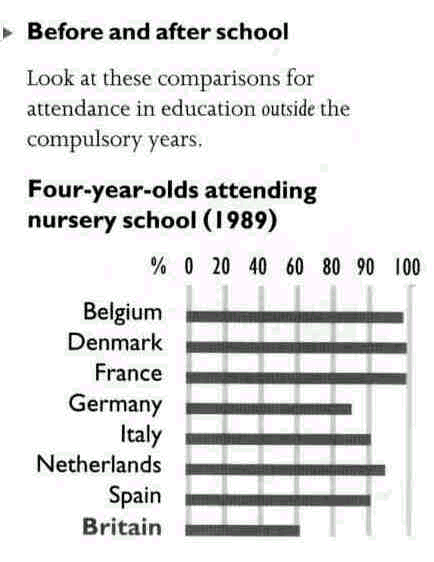
much of the public debate about educational policy still focuses not ; so much on how to help people develop useful knowledge and skills i as on how education might help to bring about a better society - on social justice rather than on efficiency.
This approach has had a far-reaching effect on many aspects of the educational system. First of all, it has influenced die general style of teaching, which has tended to give priority to developing understanding rather than acquiring factual knowledge and learning to apply this knowledge to specific tasks. This is why British young people do not appear to have to work as hard as their counterparts in other European countries. Primary schoolchildren do not have as much formal homework to do and university students have fewer hours of programmed attendance than students on the continent do. (On the other hand, they receive greater personal guidance with their work). A second effect has been an emphasis on academic ability rather than practical ability (despite English anti-intellectualism - see chapter 5). This has resulted in high-quality education for the intelligent and academically inclined (at the upper secondary and university levels) with comparatively little attention given to the educational needs of the rest.
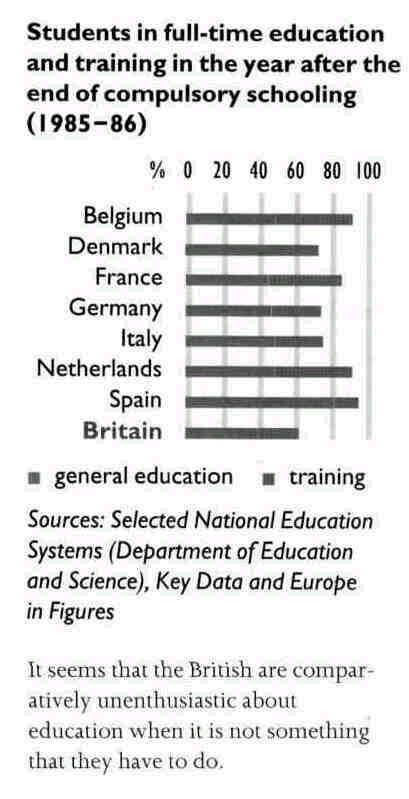
The traditional approach, together with the dislike of centralized authority, also helps to explain why the British school system got a national curriculum (a national specification of learning objectives) so much later than other European countries. If your aim is so vague and universal, it is difficult to specify what its elements are. It is for the same reason that British schools and universities have tended to give such a high priority to sport. The idea is that it helps to develop the 'complete' person. The importance of school as a 'community' can increase this emphasis. Sporting success enhances the reputation of an institution. Until the last quarter of the twentieth century, certain sports at some universities (especially Oxford and Cambridge) and medical schools were played to an international standard. People with poor academic records were sometimes accepted as students because of their sporting prowess (although, unlike in the USA, this practice was always unofficial).
Recent developments
Some of the many changes that took place in British education in the second half of the twentieth century simply reflected the wider social process of increased egalitarianism. The elitist institutions which first set the pattern no longer set the trend, and are themselves less elitist.
In other cases the changes have been the result of government policy. Before 1965 most children in the country had to take an exam at about the age of eleven, at the end of their primary schooling. If
134 14 Education
>
Learning for its own sake One
effect of the traditional British emphasis on academic learning as
opposed to practical training can be seen in the way that people
gain qualifications for certain professions. In many cases
this has not traditionally been done within universities. Instead,
people go to specialized institutions which are separate from any
university. You can study architecture at university, but most
architects have learnt their profession at a separate School
of Architecture. You can study law at university but this alone
does not qualify you to be a lawyer (see chapter 11). You cannot
get a ." teacher's qualification by doing an ordinary
university course - most teachers get theirs at teacher training
colleges. Until recently, schools were not usually involved in
helping people to get qualifications for skilled manual jobs such
as bricklaying or carpentry or machine-operating.
they passed this exam,
they went to a grammar school where they were taught academic
subjects to prepare them for university, the professions,
managerial jobs or other highly-skilled jobs; if they failed, they
went to a secondary modern school, where the lessons had a more
practical and technical bias. Many people argued that it was wrong
for a person's future life to be decided at so young an age. The
children who went to 'secondary moderns' tended to be seen as
'failures'. Moreover, it was noticed that the children who passed
this exam (known as the 'eleven plus') were almost all from
middle-class families. The system seemed to reinforce class
distinctions. It was also unfair because the proportion of children
who went to a grammar school varied greatly from area to area (from
15% to 40%). During the 1960s these criticisms came to be accepted
by a majority of the public. Over the next decade the division into
grammar schools and secondary modern schools was changed. These
days, most eleven-year-olds all go on to the same local school.
These schools are known as comprehensive schools. (The decision to
make this change was in the hands of LEAs, so it did not happen at
the same time all over the country. In fact, there are still one or
two places where the old system is still in force.)
However, the comprehensive system has also had its critics. Many
people felt that there should be more choice available to parents
and disliked the uniformity of education given to teenagers. In
addition, there is a widespread feeling that educational standards
fell during the 1980s and that the average eleven-year old in
Britain is significantly less literate and less numerate than his
or her European counterpart.
Starting in the late 1980s, two major changes were introduced by
the government. The first of these was the setting up of a national
curriculum. For the first time in British education there is now a
set of learning objectives for each year of compulsory school and
all state schools are obliged to work towards these objectives. The
national curriculum is being introduced gradually and will not be
operating fully in all parts of Britain until the end of the1990s.
The other major change is that schools can now decide to 'opt out'
of the control of the LEA and put themselves directly under the
control of the appropriate government department. These
'grant-maintained' schools get their money directly from central
government. This does not mean, however, that there is more central
control. Provided they fulfil basic requirements, grant-maintained
schools do not have to ask anybody else about how to spend their
money.
One final point about the persistence of decentralization: there
are really three, not one, national curricula. There is one for
England and Wales, another for Scotland and another for Northern
Ireland. The organization of subjects and the details of the
learning objectives vary slightly from one to the other. There is
even a difference between England and Wales. Only in the latter is
the Welsh language part of the curriculum.
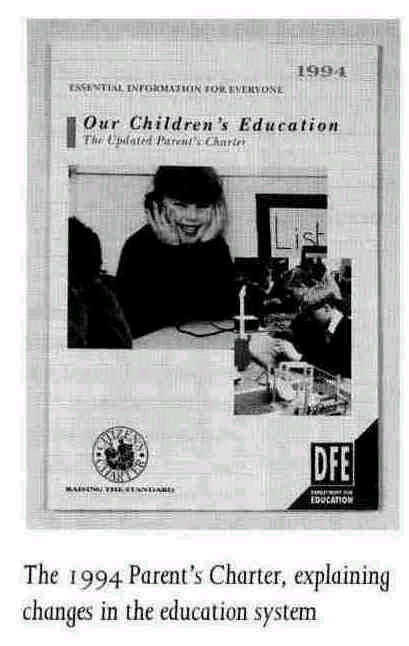
School life 135
The introduction of the national curriculum is also intended to
have an influence on the subject-matter of teaching. At the lower primary level, this
means a greater emphasis on what are known as 'the three Rs'
(Reading, wRiting and aRithmetic). At higher levels, it means a
greater emphasis on science and technology. A consequence of
the traditional British approach to education had been the habit of
giving a relatively large amount of attention to the arts and
humanities (which develop the well-rounded human being), and
relatively little to science and technology (which develop the
ability to do specific jobs). The prevailing belief at the time of
writing is that Britain needs more scientists and technicians (>
A nation of ignoramuses? ).
School life There
is no countrywide system of nursery (i.e. pre-primary) schools. In
some areas primary schools have nursery schools attached to them,
but in others there is no provision of this kind. Many children do
not begin full-time attendance at school until they are about five
and start primary school. Almost all schools are either primary or
secondary only, the latter being generally larger.
Nearly all schools work a five-day week, with no half-day, and are
closed on Saturdays. The day starts at or just before nine o'clock
and finishes between three and four, or a bit later for older
children. The lunch break usually lasts about an
hour-and-a-quarter. Nearly two-thirds of pupils have lunch provided
by the school. Parents pay for this, except for the 15°/o
who are rated poor enough for it to be free. Other children either
go home for lunch or take sandwiches.
Methods of teaching vary, but there is most commonly a balance
between formal lessons with the teacher at the front of the
classroom, and activities in which children work in small groups
round a table with the teacher supervising. In primary schools, the
children are mostly taught by a class teacher who teaches all
subjects. At the ages of seven and eleven, children have to take
national tests in English, mathematics and science. In secondary
schools, pupils have different teachers for different subjects and
are given regular homework.
>
A nation of ignoramuses?
Does the earth go around the
sun or does the sun go around the earth? This was one of the
questions a representative sample of 13,000 adults was asked
in a study conducted by the European Commission in 1993. Guess
which state in the European Union came last in knowledge of basic
astronomical and evolutionary facts! A third of those questioned in
Britain got that sun-earth question wrong, and half of them did not
know how long it takes for the earth to go around the sun. Most
spectacularly, nearly half thought that early human beings
were alive at the same time as dinosaurs.
These results reinforced the
feeling in Britain that people's basic scientific knowledge is
unacceptably low. But the results of the EC survey were not all
depressing for British scientists and educationalists. In biology,
the British appeared comparatively knowledgeable (although
still not top of the European league). The survey also showed
that, contrary to what was supposed, scientists are very highly
respected.
|
> The school year
|
|||||
|
Schools usually divide their year into three 'terms', starting at the beginning of September.
|
|||||
|
Autumn term
|
Christmas holiday (about 2 weeks)
|
Spring term
|
Easter holiday (about 2 weeks)
|
Summer term
|
Summer holiday (about 6 weeks)
|
|
In addition, all schools have a 'half-term' (= half-term holiday), lasting a few days or a week in the middle of each term.
|
|||||
136 14
Education
Public exams
The organization of the exams which schoolchildren take from the age of about fifteen onwards exemplifies both the lack of uniformity in British education and also the traditional 'hands-off approach of British governments. First, these exams are not set by the government, but rather by independent examining boards. There are several of these. Everywhere except Scotland (which has its own single board), each school or LEA decides which board's exams its pupils take. Some schools even enter their pupils for the exams of more than one board.
Second, the boards publish a separate syllabus for each subject. There is no unified school-leaving exam or school-leaving certificate. Some boards offer a vast range of subjects. In practice, nearly all pupils do exams in English language, maths and a science subject, and most also do an exam in technology and one in a foreign language, usually French. Many students take exams in three or more additional subjects.
Third, the exams have nothing to do with school years as such. They are divorced from the school system. There is nothing to stop a sixty-five year-old doing a few of them for fun. In practice, of course, the vast majority of people who do these exams are school pupils, but formally it is individual people who enter for these exams, not pupils in a particular year of school.
An example of the independence of the examining boards is the decision of one of them (the Northern Examinations Board) in 1992 to include certain popular television programmes on their English literature syllabus. This was against the spirit of the government's education policy at that time. The idea of 100,000 schoolchildren settling down to watch the Australian soap opera Neighbours as part of their homework made government ministers very angry, but there was nothing they could do to stop it.
Education beyond sixteen
At the age of sixteen people are free to leave school if they want to. With Britain's newfound enthusiasm for continuing education (and because there are not enough unskilled jobs to go round), far fewer sixteen-year-olds go straight out and look for a job than used to. About a third of them still take this option, however. Most do not find employment immediately and many take part in training schemes "which involve on-the-job training combined with part-time college courses.
Education beyond sixteen 137
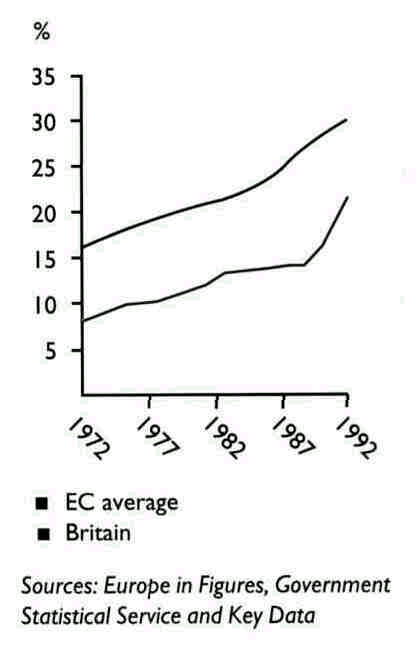
GCSE = General Certificate of
Secondary Education. The exams taken by most fifteen- to sixteen-year-olds in England, Wales and Northern Ireland. Marks are given for each subject separately. The syllabuses and methods of examination of the various examining boards differ. However, there is a uniform system of marks, all being graded from A to G. Grades A, B and C are regarded as 'good' grades.
SCE = Scottish Certificate of Education. The Scottish equivalent of GCSE. These exams are set by the Scottish Examinations Board. Grades are awarded in numbers (i = the best).
A Levels = Advanced Levels. Higher-level academic exams set by the same examining boards that set GCSE exams. They are taken mostly by people around the age of eighteen who wish to go on to higher education.
SCE 'Highers' = The Scottish equivalent of A-levels.
GNVQ = General National Vocational Qualification. Courses and exams in job-related subjects. They are divided into five levels, the lowest level being equivalent to GCSEs/SCEs and the third level to A-levels/'Highers'. Most commonly, GNVQ courses are studied at Colleges of Further Education, but more and more schools are also offering them.
Degree: A qualification from a university. (Other qualifications obtained after secondary education are usually called 'certificate* or 'diploma'). Students studying for a first degree are called undergraduates. When they have been awarded a degree, they are known as graduates. Most people get honours degrees, awarded in different classes. These are:
Class I (known as 'a first') Class II,I (‘a 2,1' or 'an upper
second') Class II,II (‘a 2,2' or 'a lower
second') ClassII1 ('a third') A student who is below one of these gets a pass degree (i.e. not an honours degree).
Bachelor's Degree: The general name for a first degree, most commonly a BA ( = Bachelor of Arts) or BSc(= Bachelor of Science).
Master's Degree: The general name for a second (postgraduate) degree, most commonly an MA or MSc. At Scottish universities, however, these titles are used for first degrees.
Doctorate: The highest academic qualification. This usually (but not everywhere) carries the title PhD
(= Doctor of Philosophy). The time taken to complete a doctorate varies, but it is generally expected to involve three years of more-or-less full-time study.
> The growth of higher education
In 1960 there were less than twenty-five universities in the whole of Britain. By 1980 there were more than forty, and by now there are well over a hundred institutions which have university status.
Nineteen to twenty-two year-olds in full-time education
There
has been a great increase in educational opportunities for people
at this age or older in the last quarter of the twentieth century.
About half of those who stay in. full-time education will have to
leave their school, either because it does not have a sixth form (>
The sixth form) or because it does not teach the desired subjects,
and go to a Sixth-form College, or College of Further Education. An
increasing number do vocational training courses for particular
jobs and careers. Recent governments have been keen to increase the
availability of this type of course and its prestige (which used to
be comparatively low).
>
The sixth form
The word 'form' was the usual
word to describe a class of pupils in public schools. It was taken
over by some state schools. With the introduction of the national
curriculum it has become common to refer to 'years'. However,
'form' has been universally retained in the phrase 'sixth
form', which refers to those pupils who are studying beyond the age
of sixteen.
138 14 Education
>
The Open University
This is one development in
education in which Britain can claim to have led the world. It
was started in 1969. It allows people who do not have the
opportunity to be ordinary 'students' to study for a degree. Its
courses are taught through television, radio and specially
written coursebooks. Its students work with tutors, to whom they
send their written work and with whom they then discuss it, either
at meetings or through correspondence. In the summer, they have to
attend short residential courses of about a week.
In
England and Wales, for those who stay in education and study
conventional academic subjects, there is more specialization than
there is in most other countries. Typically, a pupil spends a whole
two years studying just three subjects, usually related ones, in
preparation for taking A-level exams (> Exams and
qualifications), though this is something else which might change
in the near future. The
independence of Britain's educational institutions is most
noticeable in universities. They make their own choices of who to
accept on their courses. There is no right of entry to university
for anybody. Universities normally select students on the basis of
A-level results and an interview. Those with better exam grades are
more likely to be accepted. But in principle there is nothing to
stop a university accepting a student who has no A-levels at all
and conversely, a student with top grades in several A-levels
is not guaranteed a place. The
availability of higher education has increased greatly in the
second half of the twentieth century (> The growth of higher
education). Nevertheless, finding a university place is not easy.
Universities only take the better students. Because of this, and
also because of the relatively high degree of personal supervision
of students which the low ratio of students to staff allows, nearly
all university students complete their studies - and in a very
short time too! In England, Wales and Northern Ireland, it is only
for modern languages and certain vocational studies that students
take more than three years. In Scotland, four years is the norm for
most subjects. Another
reason for the low drop-out rate is that 'full-time' really means
full-time. A large proportion of students live 'on campus', (or, in
Oxford and Cambridge, 'in college') or in rooms nearby, which tends
to mean that the student is surrounded by a university atmosphere. However,
the expansion of higher education is putting a strain on these
characteristics. More students means more expense for the state.
The government's response has been to abolish the student grant
which, at one time, covered most of a student's expenses during the
thirty-week teaching year. On top of that, most students have to
pay fees. As a result, many more students cannot afford to live
away from home. In 1975 it was estimated that 80% of all university
students were non-local. This percentage is becoming lower and
lower. In addition, more than a third of students now have
part-time jobs, which means that they cannot spend so much time on
their studies. A further result of increased numbers of students
without a corresponding increase in budgets is that the
student/staff ratio has been getting higher. All of these
developments threaten to reduce the traditionally high quality
of British university education. They also threaten to reduce its
availability to students from low-income families.
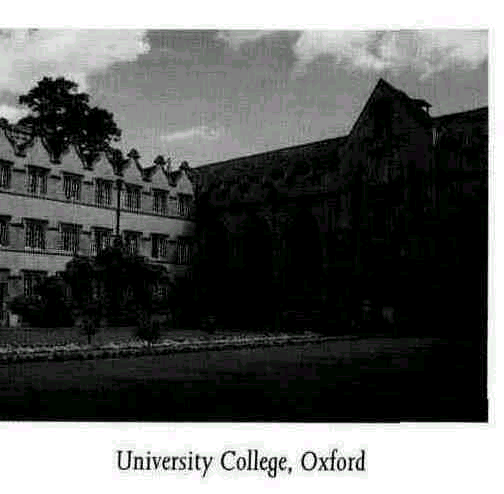
Education beyond sixteen 139
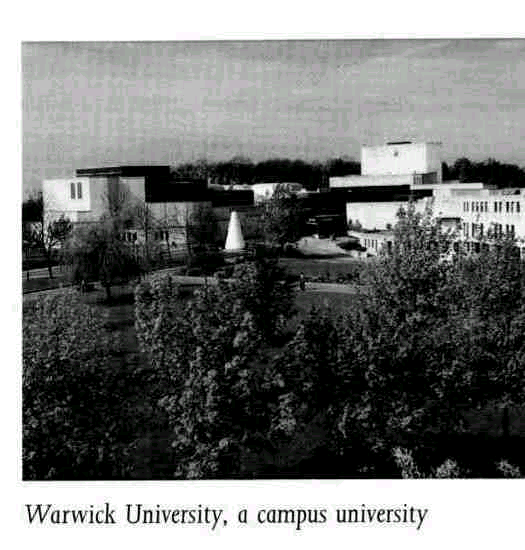
There are no important official or
legal distinctions between the various types of university in the country. But it is possible to discern a few broad categories.
> Oxbridge
This name denotes the universities of Oxford and Cambridge, both founded in the medieval period. They are federations of semi-independent colleges, each college having its own staff, known as 'Fellows'. Most colleges have their own dining hall, library and chapel and contain enough accommodation for at least half of their students. The Fellows teach the college students, either one-to-one or in very small groups (known as 'tutorials' in Oxford and 'supervisions' in Cambridge). Oxbridge has the lowest student/staff ratio in Britain. Lectures and laboratory work are organized at university level. As well as the college libraries, there are the two university libraries, both of which are legally entitled to a free copy of every book published in Britain. Before 1970 all Oxbridge colleges were single-sex (mostly for men). Now, the majority admit both sexes.
> The old Scottish universities
By 1600 Scotland boasted four universities. They were Glasgow, Edinburgh, Aberdeen and St Andrews. The last of these resembles Oxbridge in many ways, while the other three are more like civic universities (see below) in that most of the students live at home or find their own rooms in town. At all of them the pattern of study is closer to the continental tradition than to the English one - there is less specialization than at Oxbridge.
• The early nineteenth-century English universities
Durham University was founded in 1832. Its collegiate living arrangements are similar to Oxbridge, but academic matters are organized at university level. The University of London started in 1836 with just two colleges. Many more have joined since, scattered widely around the city, so that each college (most are non-residential) is almost a separate university. The central organization is responsible for little more than exams and the awarding of degrees.
•The older civic ('redbrick') universities
During the nineteenth century various institutes of higher education, usually with a technical bias, sprang up in the new industrial towns and cities such as Birmingham, Manchester and Leeds. Their buildings were of local material, often brick, in contrast to the stone of older universities (hence the name, 'redbrick'). They catered only for local people. At first, they prepared students for London University degrees, but later they were given the right to award their own degrees, and so became universities themselves. In the mid twentieth century they started to accept students from all over the country.
•The campus universities
These are purpose-built institutions located in the countryside but close to towns. Examples are East Anglia, Lancaster, Sussex and Warwick. They have accommodation for most of their students on site and from their beginning, mostly in the early 1960s, attracted students from all over the country. (Many were known as centres of student protest in the late 1960s and early 1970s.) They tend to emphasize relatively 'new' academic disciplines such as social sciences and to make greater use than other universities of teaching in small groups, often known as 'seminars'.
•The newer civic universities
These were originally technical colleges set up by local authorities in the first half of the twentieth century. Their upgrading to university status took place in two waves. The first wave occurred in the mid 1960s, when ten of them (e.g. Aston in Birmingham, Salford near Manchester and Strathclyde in Glasgow) were promoted in this way. Then, in the early 19/os, another thirty became 'polytechnics', which meant that as well as continuing with their former courses, they were allowed to teach degree courses (the degrees being awarded by a national body). In the early 1990s most of these (and also some other colleges) became universities. Their most notable feature is flexibility with regard to studying arrangements, including 'sandwich' courses (i.e. studies interrupted by periods of time outside education). They are now all financed by central government.
140 14 Education
QUESTIONS
1 From your reading of this chapter, what can you say about the trends in the British educational system? Is it moving towards greater or lesser uniformity? Towards more or less provision before and after the years of compulsory schooling? Concentrating more on purely academic subjects or on more practical ones?
2 Here are the ten subjects which, according to the national curriculum for England, must be taught in the first three years of secondary education: English, Mathematics (Maths), Science, Technology, History, Geography, a modem foreign language (French is the most common), Art, Music and Physical Education (PE). Is there anything here that surprises you? Do you think any other subjects should be included? Are these the main subjects taught in your country?
3 Would you say that people in your country are more or less enthusiastic about university education than they are in Britain?
4 In what ways has the pursuit of equality for all affected the development of the educational system in Britain? Would you say that there was equality of opportunity in the present system?
5 What would you say are the successes and failures of the British educational system? What things, if any, does it appear to do well, and what areas does it seem to neglect or do badly in?
SUGGESTIONS
• Any British Council library has lots of information about educational institutions in Britain. For example, a look at a few university prospectuses would help you to get the flavour of British universities (but remember, of course, that these prospectuses function as advertisements!). Alternatively, you could write to British universities (including the Open University) for free information or prospectuses.
• David Lodge's contemporary social comedies Small World and Nice Work have a university background. Brideshead Revisited by Evelyn Waugh paints a romantic view of life as lived by Oxford undergraduates in the nineteen twenties and Porterhouse Blue by Tom Sharpe is a comedy of contemporary Oxbridge student life. Educating Rita is a play by Willy Russell (which has also been made into a film) about a working-class woman from Liverpool whose life is transformed by studying with the Open University.
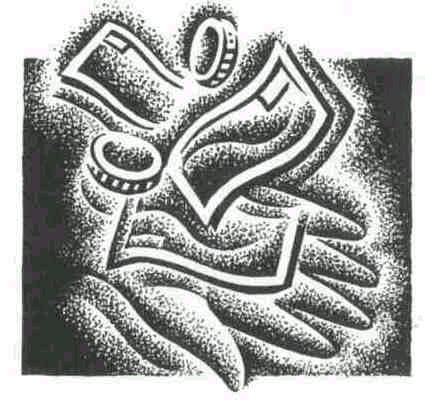
The economy and everyday life
The one thing the English will never forgive the Germans for is
working too hard.
GEORGE MIKES
This statement was written by a Hungarian humourist who emigrated to Britain in 1938. He wrote it in the 196os, when the German economy was rapidly overtaking Britain's. Living standards in Britain have risen steadily since then, but not as fast, perhaps, as they have in other EU countries. Britain used to be one of the wealthiest countries in Europe. These days it is often, by most standards of measurement, poorer than the EU average. (In fact, in 1992 it was even poor enough to qualify for special EU funding for poorer member states, though national pride prevented it from applying.)
Earning money
The statement above is, of course, not literally true. However, it does reflect a certain lack of enthusiasm for work in general. At the upper end of the social scale this attitude to work exists because leisure has always been the main outward sign of aristocracy. And because of Britain's class system, it has had its effects throughout society. If you have to work, then the less it looks like work the better. Traditionally therefore, a major sign of being middle class (as opposed to working class) has been that you do non-manual work. The fact that skilled manual (or 'blue-collar') workers have been paid more highly than the lower grades of'white-collar' (i.e. non-manual) worker for several decades has only slightly changed this social perception. This 'anti-work' outlook among the working class has led to a relative lack of ambition or enthusiasm and a belief that high earnings are more important than job satisfaction.
These attitudes are slowly changing. For example, at least half of the workforce now does non-manual work, and yet a majority describe themselves as working class (see chapter 4). It would therefore seem that the connection between being middle class and doing non-manual work is growing weaker. Nevertheless, the connection between class distinctions and types of work lives on in a number of ways. One illustration of this is the different way in which earnings
14 2 15 The economy and everyday life
>
Top people
In Britain, particular
occupations are no longer as closely associated with particular
classes as they used to be. The feminist movement, the expansion
of higher education and an egalitarian atmosphere have reduced the
influence of old-established, male-dominated institutions such
as public schools and Oxbridge (see chapter 14). A popular claim is
that in modern Britain people achieve their positions by exercising
their abilities rather than as a result of their backgrounds. In
the early 1990s it was true that even the Prime Minister (John
Major) had been educated at a state school and had left full-time
education at the age of sixteen.
However, there is a limit to
these changes. In 1992 The Economist magazine drew up a list
of the holders of 100 of the most important positions in the
country (in politics, the civil service, the armed forces,
academia, the arts, business and finance). The backgrounds of these
'top' people were then compared with those of people in similar
positions in 1972. Here are the results:
>
How they are paid
In
both years two-thirds of the top people had been to public school
(to which less than ^% of the population goes) and an astonishing
proportion to just one of these. It was more important in 1992 to
be highly educated than it was in 1972. But still half of all
the top jobs were held by people from just two of the country's
universities. And women are almost completely excluded (in both
years' lists, one of those women was the Queen!).
are conventionally
expressed and paid (> How they are paid). Another is the fact
that certain organizations of professional workers, such as the
National Union of Teachers (NUT), have never belonged to the Trades
Union Congress (see below). The connection can also be seen if we
look at those people who hold the most important jobs in the
country (> Top people).
Perhaps the traditional lack of
enthusiasm for work is the reason why the working day, in
comparison with most European countries, starts rather late
(usually at eight o'clock for manual workers and around nine for
non-manual workers). However, measured by the number of hours
worked in a week, the British reputation for not working hard
enough appears to be false (l> The industrious British). The
normal lunch break is an hour or less, and most people (unless they
work part-time) continue working until five or later. Many people
often work several hours overtime a week. In addition, a
comparatively large proportion of British people stay in the
workforce for a comparatively large part of their lives. The normal
retiring age for most people is sixty-five (sixty for some,
including a greater proportion of women).
There
are three main ways in which people look for work in Britain:
through newspapers (national ones for the highest-qualified,
otherwise local ones), through the local job centre (which is run
as a government service) and through privately-run employment
agencies (which take a commission from employers). The overall
trend in employment over the last quarter of the twentieth century
has been basically the same as elsewhere in western Europe. The
level of unemployment has gradually risen and most new job
opportunities are in the service sector (in communications, health
care and social care, for example). This
situation has led to an interesting irony with regard to the two
sexes. The decline of heavy industry means fewer jobs in
stereotypical 'men's work', while the rise in service
occupations means an increase in vacancies for stereotypical
'women's work'. In 1970 around 65% of all those in work in Britain
were men. In 1993 men made up only 51% of the workforce. When the
law against sex discrimination in employment was passed in 1975, it
was intended
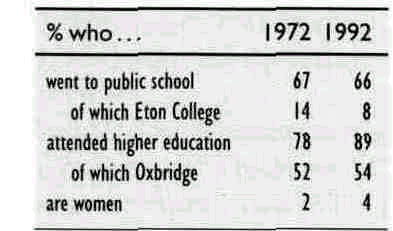
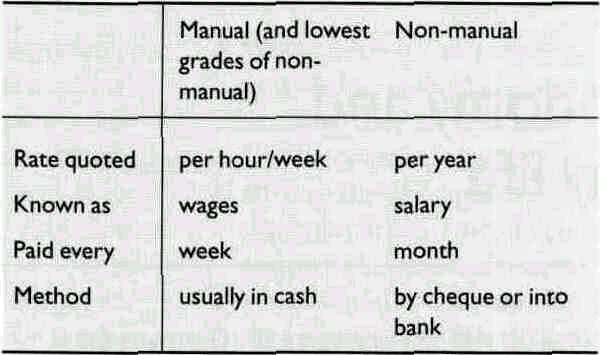
Average length of working week (1989)
• full-time employees B full-time self-employed hours
Work organizations 143
Percent of population in the labour force (1989)
Those either in work or looking for work
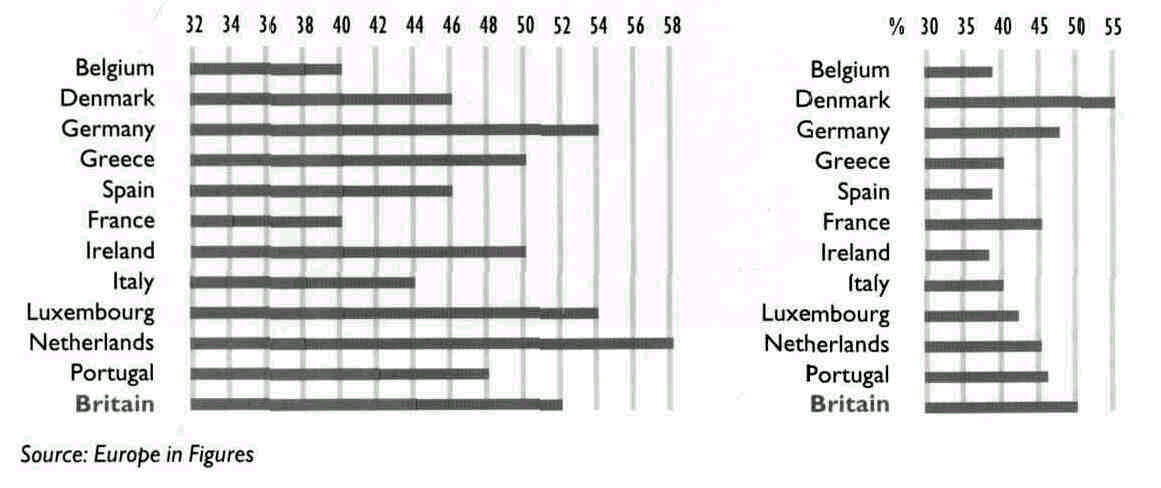
mainly to protect
women. However, in 1994 nearly half of the complaints received by
the Equal Opportunities Commission (which helps to enforce the law)
came from men. In that year there were two-and-a-half times as many
unemployed men as there were unemployed women. Many men now
seek employment as nurses, child carers, shop assistants,
secretaries and other kinds of office worker. But they often find
that, for no justifiable reason, they are not hired. It seems that
these jobs are still considered to be more suitable for women. One
of the reasons for this may be the low rates of pay in these areas
of work. Although it is illegal for women to be paid less than men
for the same job, in 1993 the average full-time male employee
earned about 50% more than the average full-time female
worker. Work
organizations The
organization which represents employers in private industry is
called the Confederation of British Industry (CBI). Most employers
belong to it and so the advice which it gives to trade unions and
the government is quite influential. The Trades Union Congress
(TUC) is a voluntary association of the country's trade unions.
There are more than a hundred of these, representing employees in
all types of business. Most
British unions are connected with particular occupations. Many
belong to the Labour party (see chapter 6) to which their members
pay a 'political levy'. That is, a small part of their union
membership subscription is passed on to the party, although they
have the right to 'contract out' of this arrangement if they want
to. However, the unions themselves are not usually formed along
party lines; that is, there is usually only one union for each
group of
>
The industrious British
The British may not like work
very much. But they seem to spend a lot of time doing it. Look at
the European comparisons above. The figures show that in
Britain, full-time employees work the longest ,hours in Europe,
self-employed people work longer than in most other European
countries and more people between the ages of twenty-five and
sixty, especially women, stay in 'the job market' than they do in
most other European countries. Moreover, holiday periods in Britain
are comparatively short and the country has a comparatively small
number of public holidays (see chapter 23).
144 15 The economy and everyday life
>
Labour relations: a glossary
When there is a dispute
between employees and management, the matter sometimes goes to
arbitration;
that is, both sides agree to let an independent investigator settle
the dispute for them.
Refusing to work in the
normal way is generally referred to as industrial
action (even when
the work has nothing to do with industry). This can take various
forms. One of these is a
work-to-rule, in
which employees follow the regulations concerning their jobs
exactly and refuse to be flexible or co-operative in the normal
way. Another is a
go slow.
Finally, the employees might
go on
strike. Strikes can be official, if all the procedures required to
make them legal have taken place, or unofficial (when they are
sometimes referred to as wildcat strikes). When there is a
strike, some strikers act as pickets. They stand at the entrance to
the worksite and try to dissuade any fellow-workers who might not
want to strike (whom they call blacklegs) from going into work.
employees
rather than a separate one for each political party within that
group.
Unions have local branches, some of which are called 'chapels',
reflecting a historical link with nonconformism (see chapter 13).
At the work site, a union is represented by a shop steward, who
negotiates with the on-site management. His (very rarely is it
'her') struggles with the foreman, the management-appointed
overseer, became part of twentieth century folklore.
Union membership has been declining since 1979 (> The decline of
the unions). Immediately before then, the leader of the TUC (its
General Secretary) was one of the most powerful people in the
country and was regularly consulted by the Prime Minister and other
important government figures. At that time the members of unions
belonging to the TUC made up more than half of all employed people
in the country. But a large section of the public became
disillusioned with the power of the unions and the government then
passed laws to restrict this power. Perhaps the decline in union
membership is inevitable in view of the history of British
unions as organizations for full-time male industrial workers. To
the increasing numbers of . female and part-time workers in the
workforce, the traditional structure of British unionism has
seemed less relevant. In an effort to halt the decline, the TUC
declared in 19 94 that it was loosening its contacts with the
Labour party and was going to forge closer contacts with other
parties.
One other work organization needs special mention. This is the
National Union of Farmers (NUF). It does not belong to the TUC,
being made up mostly of agricultural employers and independent
farmers. Considering the small number of people involved in
agriculture in Britain (the smallest proportion in the whole
of the EU), it has a remarkably large influence. This is perhaps
because of the special fascination that 'the land' holds for most
British people (see chapter ^), making it relatively easy for the
NUF to make its demands heard, and also because many of its members
are wealthy.
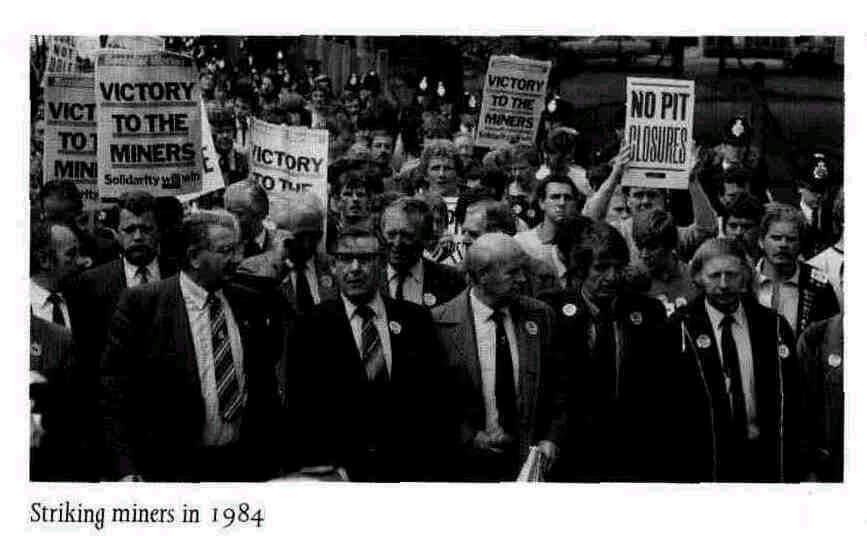
The structure of trade and industry 145
The
structure of trade and industry The
'modernization* of business and industry happened later in Britain
than it did in most other European countries. It was not until the
19605 that large corporations started to dominate and that a
'management class', trained at business school, began to emerge.
Even after that time, many companies still preferred to recruit
their managers from people who had 'worked their way up' through
the company ranks and/or who were personally known to the
directors. Only in the 1980s did graduate business qualifications
become the norm for newly-hired managers.
British industry performed poorly during the decades following the
Second World War (some people blamed this on the above
characteristics). In contrast, British agriculture was very
successful. In this industry, large scale organization (i.e. big
farms) had been more common in Britain than in other European
countries for quite a long time.
As in all European countries, the economic system in Britain is a
mixture of private and public enterprise. Exactly how much of the
country's economy is controlled by the state has fluctuated a great
deal in the last fifty years and has been the subject of continual
political debate. From 1945 until 1980 the general trend was for
the state to have more and more control. Various industries became
nationalized (in other words, owned by the government), especially
those concerned with the production and distribution of energy. So
too did the various forms of transport and communication services
(as well, of course, as the provision of education, social welfare
and health care). By 1980, 'pure' capitalism probably formed a
smaller part of the economy than in any other country in western
Europe.
From 1980 the trend started going in the other direction. A major
part of the philosophy of the Conservative government of the 198os
was to let 'market forces' rule (which meant restricting the
freedom of business as little as possible) and to turn state-owned
companies into companies owned by individuals (who became
shareholders). This approach was a major part of the thinking of
Thatcherism (Margaret Thatcher was Prime Minister at that time).
Between 1980 and 1994 a large number of companies were privatized
(or 'denationalized'). That is, they were sold off by the
government. By 1988 there were more shareholders in the country
than there were members of unions. In addition, local government
authorities were encouraged to 'contract out' their responsibility
for services to commercial organizations.
The privatization of services which western people now regard as
essential has necessitated the creation of various public
'watchdog' organizations with regulatory powers over the industries
which they monitor. For example, Offtel monitors the activities of
the privatized telephone industry, and Off Wat monitors the
privatized water companies.
>
The decline of the unions
In the 19805 the British
government passed several laws to restrict the power of the unions.
One of these abolished the 'closed shop' (an arrangement which
employers made with unions to hire only people who belonged to a
union). Another made strikes illegal unless a postal vote of all
union members had been conducted. In 1984 there was a long miners'
strike. The National Union of Miners refused to follow the new
regulations. Its leader, Arthur Scargill, became a symbol
(depending on your point of view) of either all the worst lunacies
of unionism or the brave fight of the working classes against the
rise of Thatcherism. Previous miners' strikes in the twentieth
century had been mostly successful. But this one was not (the
miners did not achieve their aims); a sign of the decline in union
power. Here is another sign (the TUC is the Trades Union Congress,
the national association of trade unions): Total
membership of the TUC
millions
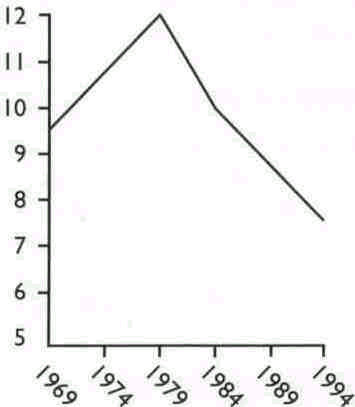
146
> The widening gap between rich and poor
£0.50
-\
Source:
Social Trends 1994
The graph shows that for every
pound that the poorest 20% of the population in Britain had in 1978,
most people had two pounds and the richest 20% of the population had
three pounds. In 1994 the gap in wealth had grown. The richest
people were about 50% richer, and most people were about 25'%
richer. The poorest people had, however, become slightly poorer. >
Collecting taxes
The government organization
which is responsible for collecting taxes in Britain is called the
Inland Revenue. For employees, paying their income tax is not
something they have to worry about. It is deducted from their pay
cheque or pay packet before they receive it. This system is known as
PAYE ( = pay as you earn), The tax added to the price of something
you buy is called VAT (= value added tax).
The
distribution of wealth
In the early 1970s Britain had one of the most equitable
distributio: of wealth in western
Europe. By the early 1990s it had one of the least equitable. The
rich had got richer but the poor had not. Some surveys suggested
that, by this time, the gap between the richest 10% of the
population and the poorest 10% was as great as it had been in the
late nineteenth century and that large numbers of house holds were
living below the 'poverty line', which meant that they did not have
enough money for basic things such as food and heating. Class
and wealth do not run parallel in Britain (see chapter 4), so it is
not a country where people are especially keen to flaunt their
wealth. Similarly, people are generally not ashamed to be poor. Of
course, they don't like being poor, but they do not feel obliged to
hide the fact. This can sometimes lead to an acceptance of poverty
which is surprising for an 'advanced' country. When, in 1992, new of
its increasing extent came to wider public attention, the
government neither pretended that greater poverty did not
exist, nor promised to do anything radical about it. Instead, it
issued, through the Ministry of Agriculture, a suggested diet which
it claimed even the poorest could afford. There were, of course,
public comments about the patronizing nature of this action, but
criticism in the press concentrated on how unrealistic the diet was,
on how the figures didn't add up (and on the mystery of how a person
should prepare and eat the recommended half an egg a week!). One
reason for the increasing disparity of wealth in Britain in the
1970s and 1980s is that rates of income tax changed. For a short
period in the 1960s the basic rate was 40%. By the early eighties it
was 30% and it then went down to 25%. During the same period, the
top rate of income tax fell from a high of 98% to 40%. Of course,
these figures do not mean that this is how much is deducted from a
person s earnings. People in different situations are allowed to
earn varying amounts before tax is deducted. People earning twice
the average wage have about 25% of their gross income deducted.
Somebody earning less than half the average wage pays very
little tax at all. Nevertheless, there is, at the time of writing, a
great disparity in different people's 'take-home pay'. During the
1980s, rates of pay for the best-paid jobs increased faster than
those for badly-paid jobs. People in the best-paid jobs now take
home about ten times as much as those in the lowest paid jobs. Many
company directors, for example, take home seven times as much as the
average wage.
Finance
and investment Wealth
(and poverty) are relative concepts. Despite its relative economic
decline, Britain is still one of the wealthiest places in the world.
The empire has gone, the great manufacturing industries have
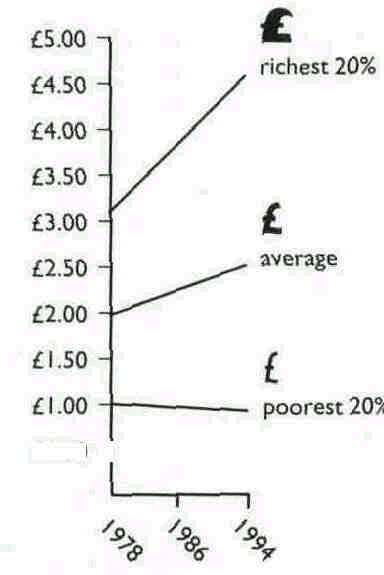
Finance and investment 147
nearly gone, but
London is still one of the centres of the financial world. The
Financial Times-Stock Exchange (FT-SE) Index of the 100 largest
British companies (known popularly as the 'Footsie') is one of the
main indicators of world stock market prices.
The reason for this is not hard to find. The same features that
contributed to the country's decline as a great industrial and
political power — the preference for continuity and tradition
rather than change, the emphasis on personal contact as opposed to
demonstrated ability when deciding who gets the important jobs
— are exactly the qualities that attract investors. When people
want to invest a lot of money, what matters to them is an
atmosphere of stability and a feeling of personal trust. These are
the qualities to be found in the 'square mile' of the old City of
London (see chapter 3), which has one of the largest concentrations
of insurance companies, merchant banks, joint-stock banks and
stockbrokers in the world. As regards stability, many of the
institutions in what is known as 'the City' can point to a long and
uninterrupted history. Some of them have directors from the same
family which started them perhaps over 200 years ago. Although
there have been adaptations to modern conditions, and the
stereotyped bowler-hatted 'city gent' is a thing of the past, the
sense of continuity, epitomized by the many old buildings in the
square mile, is still strong. As regards trust, the city has a
reputation for habits of secrecy that might be thought of as
undesirable in other aspects of public life, but which in financial
dealings become an advantage. In this context, 'secrecy' means
'discretion'.
Although more than half of the British population has money
invested in the city indirectly (because the insurance companies
and pension funds to which they have entrusted their money invest
it on the stock market), most people are unaware of what goes on in
the world of 'high finance'. To most people, money is just a matter
of the cash in their pockets and their account with one of the
'high street' banks (> The high street banks). Not every adult
has a bank account. In 1970 only about 30% used these banks. But
with the increasing habit of paying wages by cheque and the advent
of cash dispensing machines, a majority now do so. Many, however,
still prefer to use their National Savings account at the post
office or one of the country's many building societies (see chapter
19).
An indication of the importance of bank accounts in people's lives
is the strong dislike of the banks that has developed. During the
1990s the newspapers carried horror stories about their practices.
In the years 1988 to 1993 banking profits rose by 50% while charges
to customers rose by 70%. It is often difficult for people to do
anything about bank charges — if they try to discuss them with
their bank, they get charged for the phone calls and letters! So
far, the one clear improvement has been in bank opening times.
These used to be from nine-thirty to three-thirty, Mondays to
Fridays only. Now, many banks stay open later and also open on
Saturday mornings.
>
The old lady ofThreadneedle Street
This is the nickname of the
Bank of England, the institution which controls the supply of
money in Britain and which is located, of course, in the 'square
mile'. Notice how the name suggests both familiarity and age - and
also conservative habits. The bank has been described as
'fascinated by its own past'. It is also notable that the people
who work there are reported to be proud of the nickname.
>
The high street banks
The so-called 'big four'
banks, which each have a branch in almost every town in Britain
are: the National Westminster Bank (NatWest); Barclays Bank; Lloyds
Bank; Midland Bank. The Bank of Scotland also has a very large
number of branches. So does the Trustee Savings Bank (TSB).
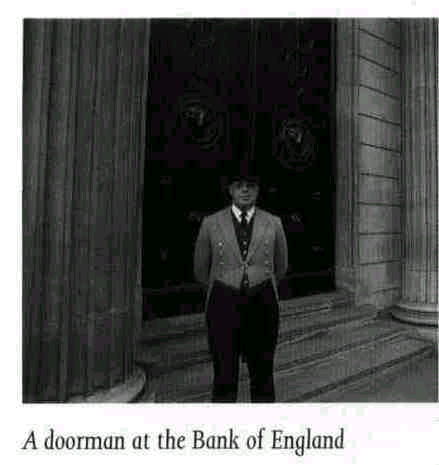
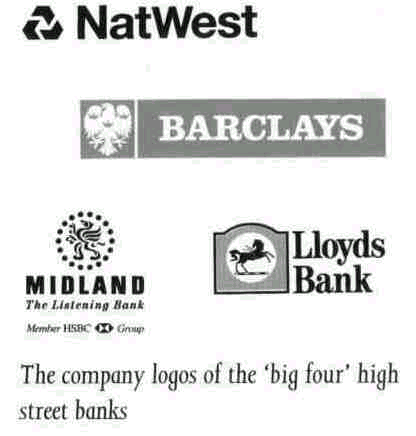
148
> Currency and cash
The currency of Britain is the pound
sterling, whose symbol is'£', always written before the amount. Informally, a pound is sometimes called a 'quid', so £20 might be expressed as 'twenty quid'. There are 100 pence (written 'p', pronounced 'pea') in a pound.
The one-pound coin has four different designs: an English one, a . Scottish one, a Northern Irish one and a Welsh one (on which the inscription on the side is in Welsh;
on all the others it is in Latin).
In Scotland, banknotes with a Scottish design are issued. These notes are perfectly legal in England, Wales and Northern Ireland, but banks and shops are not obliged to accept them if they don't want to and nobody has the right to demand change in Scottish notes.
Before 1971 Britain used the 'LSD' system. There were twelve pennies in a shilling and twenty shillings in a pound. Amounts were written like this: £3 12s. 6d. (= three pounds, twelve shillings and sixpence). If you read any novels set in Britain before 1971, you may come across the following:
a farthing = a quarter of a penny
(not used after 1960) a ha'penny (halfpenny) = half of a
penny
a threepenny bit = threepence a tanner = an informal name for a sixpenny coin a bob = an informal name for ashilling a half crown = two-and-a-half shillings (or two and sixpence)
People were not enthusiastic about the change to what they called 'new money'. For a long time afterwards, the question 'what's that in old money?' was used to imply that what somebody had just said was too complicated to be clear. In fact, money provides frequent opportunities for British conservatism (see a chapter ^) to show itself. When the one-pound coin was introduced in 1983, it was very unpopular. People said they were sad to see the end of the pound note, which it replaced, and that a mere coin didn't seem to be worth as much. Another example is the reaction to the European euro. Since 1991 this has had the same status in Britain as Scottish banknotes have in England. But the first signs were that most shops and banks were refusing to accept them.
>
How much do you want?
On tins and packets of food
in British shops, the weight of an item is written in the kilos and
grams familiar to people from continental Europe. However,
most British people have little idea of what these terms mean (see
chapter s).
Therefore, many of their packets and tins also record their
weight in pounds (written as 'Ibs') and ounces (written as 'oz').
Moreover, nobody ever asks for a kilo of apples or 200 grams of
cheese. If those were the amounts you wanted, you would have to ask
for 'two pounds or so' of apples and 'half a pound or less' of
cheese and you would be about right.
Shoe and clothing sizes are
also measured on different scales in Britain. The people who work
in shops which sell these things usually know about continental and
American sizes too, but most British people don't.
Spending
money: shopping
The British are not very adventurous shoppers. They like
reliability and buy brand-name goods wherever possible, preferably
with the price clearly marked (they are not very keen on haggling
over prices). It is therefore not surprising that a very high
proportion of the country's shops are branches of chain stores.
Visitors from northern European countries are sometimes surprised
by the shabbiness of shop-window displays, even in prosperous
areas. This is not necessarily a sign of economic depression. It is
just that the British do not demand art in their shop windows. In
general, they have been rather slow to take on the idea that
shopping might actually be fun. On the positive side, visitors are
also sometimes struck by the variety of types of shop. Most shops
are chain stores, but among those that are not, there is much
individuality. Independent shopowners feel no need to follow
conventional ideas about what a particular shop does and doesn't
sell.
In the last quarter of the twentieth century supermarkets began
moving out of town, where there was lots of free parking space. As
they did so, they became bigger, turning into 'hypermarkets'
stocking a wider variety of items. For example, most of them now
sell alcoholic drinks, which are conventionally bought at shops
called 'off-licences'. They also sell petrol and some items
traditionally found in chemists and newsagents.
However, this trend has not gone as far as it has in some other
European countries. For example, few supermarkets sell clothes,
Shop opening hours 149
shoes, kitchen
utensils or electrical goods. They still concentrate mainly on
everyday needs. An exception is the first warehouse shopping
club in Europe, opened in 1993 in Essex by the American company
Costco. Here, 'members' (who have paid a small fee) can find almost
everything that a shopper could ever want to buy - at a reduced
price. Shopping clubs of this kind have spread rapidly all over the
USA. At the time of writing, it is too early to say whether they
will do so in Britain. The move out of town, however, is already
well established, with many of the country's chain stores following
the supermarkets into specially built shopping centres, most of
them covered. (Britain has some of the largest covered shopping
areas in Europe.) In 1980 only 5% of shop sales took place in these
locations. In 1994 this figure had jumped to 25%. The
area in town where the local shops are concentrated is known as the
high street (the American equivalent is 'Main Street'). British
high streets have suffered from the move towards out-of-town
shopping. In the worst-affected towns, as many as a quarter of
the shops in the high street are vacant. But high streets have
often survived by adapting. In larger towns, shops have tended to
become either more specialized or to sell especially cheap goods
(for people who are too poor to own a car and drive out of town).
Many have become charity shops (selling second-hand items and
staffed by volunteers) and discount stores. Many of the central
streets are now reserved for pedestrians, so that they are more
pleasant to be in. Even
most small high streets still manage to have at least one
representative of the various kinds of conventional food shop (such
as butcher, grocer, fishmonger, greengrocer), which do well by
selling more expensive luxury items. (Although the middle classes
use them, supermarkets have never been regarded as 'smart* or
fashionable places in which to shop.) The
survival of the high street has been helped by the fact that
department stores have been comparatively slow to move out of town.
Almost every large town or suburb has at least one of these. They
are usually not chain stores and each company runs a maximum of a
few branches in the same region. Shop
opening hours The
normal time for shops to open is nine in the morning. Large
out-of-town supermarkets stay open all day until about eight
o'clock. Most small shops stay open all day (some take a break for
lunch, usually between one and two) and then close at half-past
five or a bit later. In some towns there is an 'early closing day'
when the shops shut at midday and do not open again. However, this
is becoming rarer. In fact, over the last twenty-five years, shop
opening hours have become more varied. Regulations have been
relaxed. It is now much easier than it used to be to find shops
open after six. In some areas the local authorities are encouraging
high street shops to
>
The corner shop
A shop by itself in a
residential area is often referred to as 'the corner shop'. These
sometimes sell various kinds of food, but they are not always
general grocers. Usually their main business is in newspapers,
magazines, sweets and tobacco products. It is from these that most
'paper rounds' (see chapter 16) are organized. Only in corner shops
do shopkeepers know their customers personally. Only in them is the
interaction across the counter often social as well as
transactional. People working in other shops are often very
helpful, but the conversation usually has some clear purpose.
In the last few decades, many
corner shops have been taken over by people from southern Asia who
have delighted the neighbourhood by staying open very long hours.
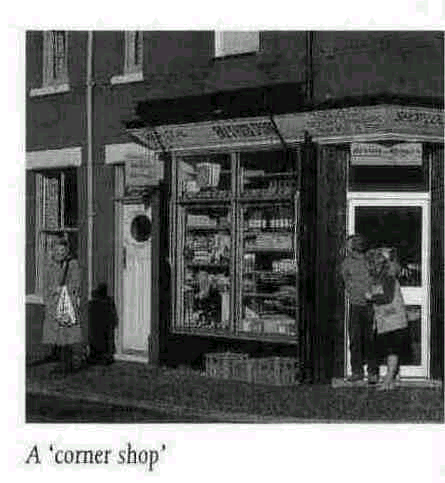
150
>
Some well-known names
The best known supermarket
chains are
Sainsbury and Tesco, although there are others. Asda is the best
known of many discount stores.
There is only one department
store with a large number of branches. This is Marks & Spencer.
It is so well-known that it is often referred to as 'Marks and
Sparks' or just 'M and S'. To the British, clothes at M and S are
typical of the middle range: they are neither cheap nor expensive,
fairly good quality and rather conservative. Unlike most other
department stores, M and S also has a 'food hall', where items are
more expensive than they are in supermarkets.
In a category all by itself is
Wool-worth's, which used to have a branch in almost every high
street in the country. It sells mostly sweets, music, toys and
children's clothes of the cheaper kind.
stay open very late on
some evenings as a way of putting new life into their 'dead' town
centres. But
the most significant change in recent years has been with regard to
Sundays. By the early 1990s many shops, including chain stores, were
opening on some Sundays, especially in the period before Christmas.
In doing this they were taking a risk with the law. Sometimes they
were taken to court, sometimes not. The rules were so old and
confused that nobody really knew what was and what wasn't legal. It
was agreed that something had to be done. On one side were the 'Keep
Sunday Special' lobby, a group of people from various Christian
churches and trade unions. They argued that Sunday should be
special, a day of rest, a day for all the family to be together.
They also feared that Sunday-opening would mean that shop workers
would be forced to work too many hours. On the other side were a
number of lobbies, especially people from women's and consumer
groups. They argued that working women needed more than one day
(Saturday) in which to rush around doing the shopping. In any case,
they argued, shopping was also something that the whole family could
do together. In 1993 Parliament voted on the matter. By a small
majority, the idea of a complete 'free-for-all' was defeated. Small
shops are allowed to open on Sundays for as long as they like, but
large shops and supermarkets can only open for a maximum of six
hours.
QUESTIONS
1 What are the differences (if any) between the present role of trade unions in Britain and their role in your country?
2 How can banking be such an important part of the British economy when some British people don't even have bank accounts?
3 Here is an extract from a book written by a Frenchman who has spent a long time living in England:
Continentals are always disconcerted by the English attitude to work. They appear neither to view it as a heavy burden imposed by fate, nor to embrace it as a sacred obligation. Effort is a matter of personal choice, and payment simply a quid pro quo. (from Les Anglais by Phillipe Daudy) Do you find the British attitude to work confusing? In your country, do people see work as a 'heavy burden' or a 'sacred obligation' (or something else) ?
4 In your country, do shops stay open for more or fewer hours a week than they do in Britain? Do you think the de-regulation of shop opening hours is a good thing?
16 The
media
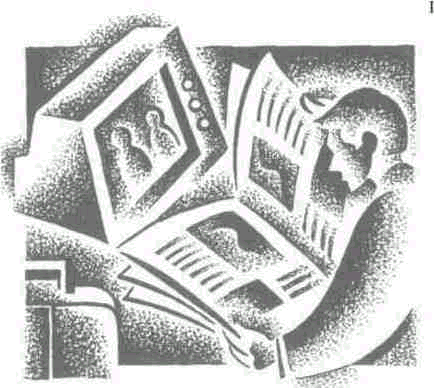
British people watch a
lot of television. They are also reported to be the world's most
dedicated home-video users. But this does not mean that they have
given up reading. They are the world's third biggest newspaper
buyers; only the Japanese and the Swedes buy more. The
importance of the national press Newspaper
publication is dominated by the national press, which is an
indication of the comparative weakness of regional identity in
Britain (see chapter 4). Nearly 80% of all households buy a copy of
one of the main national papers every day. There are more than
eighty local and regional daily papers; but the total circulation
of all of them together is much less than the combined circulation
of the national 'dailies'. The only non-national papers with
significant circulations are published in the evenings, when
they do not compete with the national papers, which always appear
in the mornings.
Most local papers do not appear on Sundays, so on that day the
dominance of the national press is absolute. The 'Sunday papers'
are so-called because that is the only day on which they appear.
Some of them are sisters of a daily (published by the same company)
but employing separate editors and journalists.
The morning newspaper is a British household institution; such an
important one that, until the laws were relaxed in the early 1990s,
newsagents were the only shops that were allowed to open on
Sundays. People could not be expected to do without their
newspapers for even one day, especially a day when there was
more free time to read them. The Sunday papers sell slightly more
copies than the national dailies and are thicker. Some of them have
six or more sections making up a total of well over 200 pages.
Another indication of the importance of'the papers' is the morning
'paper round'. Most newsagents organize these, and more than half
of the country's readers get their morning paper delivered to their
door by a teenager who gets up at around half-past five every day
in order to earn a bit of extra pocket money.
>The
national papers and Scotland
There is an exception to the
dominance of the national press throughout Britain. This is in
Scotland, where one paper, the Sunday Post, sells well over a
million copies. Another weekly, Scotland on Sunday, also has a
large circulation. There are three other notable 'Scotland only'
papers, but two of these, the Glasgow Herald and the Scotsman, are
quality papers (see page 152) with small circulations and the
other, the Daily Record, is actually the sister paper of the
(London) Doily Mirror. The other national British papers are all
sold in Scotland, although sometimes in special Scottish editions.
